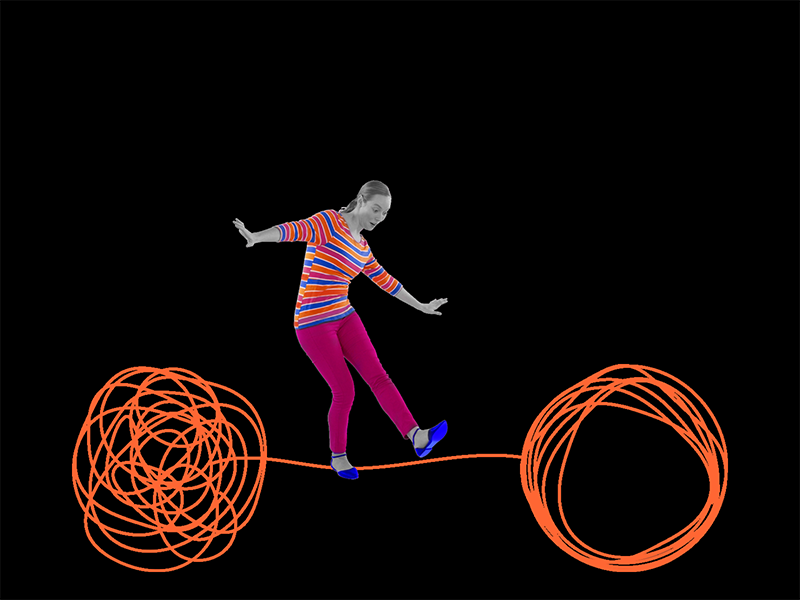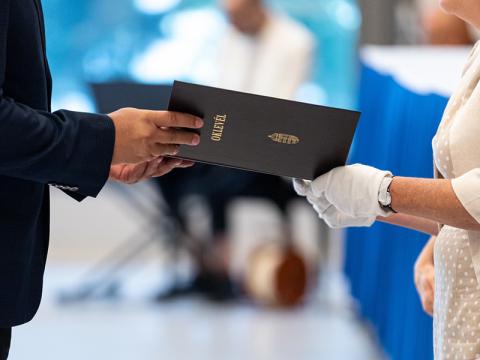Want to Get your Dissertation Accepted?
Discover how we've helped doctoral students complete their dissertations and advance their academic careers!

Join 200+ Graduated Students

Get Your Dissertation Accepted On Your Next Submission
Get customized coaching for:.
- Crafting your proposal,
- Collecting and analyzing your data, or
- Preparing your defense.
Trapped in dissertation revisions?

- Code of Ethics
- Dissertation Editing
- Dissertation Coaching
- Free Consultation
Choosing a Thesis Advisor: A Complete Guide
One of the most important choices that you will make about your dissertation or thesis happens before you write a single word. Choosing a thesis advisor or dissertation advisor (often referred to as a dissertation chair) will have a significant impact on your entire dissertation writing experience, and for many years to come. For many doctoral students, their thesis advisor is their single greatest influence in graduate school.
Selecting a thesis advisor is a big decision with far-reaching implications. The stakes are very high, and it is imperative to choose your thesis advisor wisely. There are many factors to consider when choosing a thesis advisor, from expertise to personality, and it pays to think carefully and weigh your options before approaching a faculty member to chair your dissertation committee . While there are subtle differences between a dissertation chair and a thesis advisor, we’ll focus on the commonalities in this article.
These are commonly asked questions about selecting a thesis advisor:
- What does a thesis advisor do?
- How should I choose my thesis advisor?
- What makes a faculty member a good thesis advisor?
- What if it doesn’t work out with my thesis advisor?

Thesis Advisor Responsibilities
While writing a dissertation is a largely solitary pursuit, a good thesis advisor will be with you every step of the way. While you are very much in the driver’s seat, it is your thesis advisor’s job to keep you off the guardrails. And deploy the airbag, if necessary. There are a few purposes that your thesis advisor will serve during your time together.
Guidance . While the dissertation process is new to you, your thesis advisor will know it very well. She will help you navigate the obstacles and pitfalls that have derailed many projects–department politics, university regulations, funding, research opportunities, etc. Your thesis advisor will also serve as a sounding board as you distill the nebulous concept of your research project into a fully-formed idea that you can move forward with.
Organization . A good thesis advisor will run a tight ship and keep your dissertation project moving like clockwork. As a researcher, it’s very easy to get lost in the minutiae of the literature, and it’s not difficult to find yourself trapped down a rabbit hole of scholarship. Regular milestones set by your thesis advisor are a great way to stay on track and maintain forward momentum.
Mentorship. While an effective thesis advisor will ensure that you see your project to fruition, a great one will be with you for decades. Though I graduated with my Ph.D. in 2012 and I’m now an associate professor myself, my thesis advisor remains a guiding light in my career. Your thesis advisor can be a cornerstone of your professional network.

Choosing a Thesis Advisor
So, how do you select a faculty member to chair your dissertation committee? With extreme care. Once you have set your sights on a dissertation chair or thesis advisor, the next step is the Big Ask. I remember being very nervous to approach the faculty member who became my chair– it seemed like such an imposition, but, as a grad student in her department, I was already on her radar. Keep in mind, your faculty members are expecting to be asked to chair dissertation committees, and they may even be a little flattered that you chose them.
While chairing and serving on dissertation committees is a requirement for the tenured and senior faculty members in your department, it’s a lot of work. Make no mistake: accepting the role of your dissertation chair makes them nervous, too. As a faculty member, I can say with absolute certainty that a good dissertation chair will be almost as invested in your dissertation as you are.
What Makes a Strong Thesis Advisor?
There exists a gulf between what many students desire in a dissertation chair or thesis advisor and what they actually need. While there may be a temptation to approach one of your department’s superstar faculty members to chair your committee, this may not serve you in the long term. Faculty members who have made a name for themselves through an abundance of publications, grants, awards, and conference appearances typically have jam-packed schedules, and it may be difficult for them to make you and your dissertation a priority.

A safer bet that is likely to have a more rewarding outcome is to work with a faculty member who has already shown enthusiasm for your work. Select a thesis advisor who makes time for you, and one who always responds to your emails. This is the person you want in your corner during the sometimes stressful journey of researching and writing a dissertation. Also, it never hurts to spend some time talking to potential dissertation chairs or dissertation advisors. Get all of your questions answered, and then make a decision.
What If It Doesn’t Work Out?
The possibility that your thesis advisor is a bad fit for your project or is incompatible for some other reason is a worst-case scenario that lurks in the furthest reaches of every graduate student’s mind. There’s no way to sugarcoat it: this is not a good situation to be in, and it can derail dissertations. The soundest strategy for dealing with an internecine conflict with your thesis advisor is prevention.
This is why it is vital to do your homework and put a lot of thought into choosing your thesis advisor. Find someone you are compatible with and make sure you’re on the same page. Check in with them regularly, and keep them updated. Clear communication is a great way to ensure a solid partnership with your dissertation chair. Don’t forget, your dissertation chair should also be making your success a priority. You should be comfortable enough to ask questions and let them know what’s on your mind.
The good news is that a bad fit isn’t likely to happen. Most grad students have a completely workable relationship with their dissertation chairs, and for many it turns into a long friendship built on mutual respect and admiration. Personally, every time I serve on a doctoral student’s dissertation committee, I feel a tremendous amount of pride and satisfaction when they take their place in the academic world. It’s truly an honor to help them achieve such a major milestone in their academic career, and I’m delighted to be part of it.
Related posts:

Courtney Watson, Ph.D.
Courtney Watson, Ph.D. is an Associate Professor of English at Radford University Carilion, in Roanoke, Virginia. Her areas of expertise include undergraduate and graduate curriculum development for writing courses in the health sciences and American literature with a focus on literary travel, tourism, and heritage economies. Her writing and academic scholarship has been widely published in places that include Studies in American Culture , Dialogue , and The Virginia Quarterly Review . Her research on the integration of humanities into STEM education will be published by Routledge in an upcoming collection. Dr. Watson has also been nominated by the State Council for Higher Education of Virginia’s Outstanding Faculty Rising Star Award, and she is a past winner of the National Society of Arts & Letters Regional Short Story Prize, as well as institutional awards for scholarly research and excellence in teaching. Throughout her career in higher education, Dr. Watson has served in faculty governance and administration as a frequent committee chair and program chair. As a higher education consultant, she has served as a subject matter expert, an evaluator, and a contributor to white papers exploring program development, enrollment research, and educational mergers and acquisitions.
Comments are closed.
- Skip to Content
- Catalog Home
- Institution Home
- Graduate Catalog /
- Academic Resources /
- Advising & Mentoring PhD Students /
Choosing a Dissertation Advisor
Introduction.
While some graduate groups may assign an advisor to a student upon admission to the program, in many graduate groups the responsibility for finding a dissertation advisor rests with the student. The choice of a faculty member who will supervise the dissertation work required to fulfill degree requirements is one of the most critical decisions a graduate student will make. A student will spend several years working with the faculty member of choice, and that choice will significantly affect the direction of the student’s career. Choosing a dissertation advisor, therefore, is an extremely important decision for doctoral students, although it is not immutable, as will be discussed later.
A student undertaking dissertation work needs an advisor who will be not only academically competent in a particular area but also willing to act as the student’s advocate when necessary. It is important that the student be able to work and communicate effectively with the advisor and not feel overwhelmed or intimidated in the relationship. Dissertation work can be lonely and isolating, and support from an advisor can be a crucial connection. Each student requires the guidance of someone who will stimulate thought, who has sufficient interest in the student’s topic to produce new insights jointly, and who will challenge the student to think in a novel manner about the research.
Obtaining Information on Potential Advisors
Advisors generally serve as the dissertation supervisor. Students should be familiar with the University rules about who can supervise dissertation research and serve on a dissertation committee. Several resources and strategies can help students identify an appropriate faculty advisor, as follows.
The graduate group website or handbook is a valuable source of information on potential advisors. Many graduate groups have developed websites that profile affiliated faculty members, including their areas of research, recent publications, and other academic activities. Literature searches can provide further information on the publications and preferred journals of particular faculty members. The graduate group chair can also provide valuable advice on potential advisors and can help students to become familiar with any specific graduate group policies on supervision.
Students can get to know potential advisors by taking a course, doing a lab rotation, acting as a teaching assistant, and/or attending seminars and other presentations by the faculty member.
Graduate students currently working with the potential advisor are an invaluable source of information. Students who are working or have worked with a particular advisor can be asked about their experience with that advisor and about the advisor’s expectations and working methods. Getting to know these students is also useful because anyone choosing to work with a faculty advisor would likely have close, future interactions with their students. Talking to multiple students is always encouraged given the possibly strong and differing opinions one might hear.
Students should make an appointment to meet potential advisors. Meeting a potential advisor is an essential step in determining whether a faculty member would be a good fit in terms of mentoring and interpersonal style and research interested. The following is a list of issues that might be covered in such a meeting:
- How many graduate students do you advise? (Students may not want to pick a faculty member who has too many students already.)
- Typically, how often do you meet with your students?
- Typically, how much time do you expect students to take to complete their dissertation?
- How will we agree upon my research topic?
- Are there sufficient funds available for the research project?
- What will be the sources of my stipend/funding? What are ways you can provide assistance for finding additional funding if/when my stipend expires?
- What level of independence is expected of your graduate students?
- Is there any specific knowledge I need to have before starting to work with you?
- Will I have the opportunity to attend conferences? Publish papers? Present work at colloquia? Are there funds available for me to do so?
- Are you planning a sabbatical leave soon? If so, what arrangements for continued supervision will be made during your absence?
- What opportunities would I have in this area of research when I graduate?
- How do you typically assist students on the job market?
- Will guidelines be drawn up for working together?
- How will I receive feedback on my progress?
These questions are designed to help the student and the potential advisor determine whether a good match exists. Where appropriate, the student may also want to ask about the order of authorship on publications and intellectual property issues.
For students who are able to pick an advisor, the choice of a dissertation advisor is a decision to be made with a great deal of care and consideration. Discussion of the topics listed above will also give faculty members a sense of what students expect in terms of meetings, feedback, turn-around time on submitted work, etc. Taking time to explore these issues should result in a productive relationship for both student and advisor that culminates in a dissertation of original research, completed within a reasonable period of time.
Changing Advisors
There may be situations in which a student must change advisors. Some situations are beyond the student’s control; for example, when an advisor leaves the University or otherwise becomes unavailable. In other situations, the student may want to choose a different advisor; for example, if the focus of the research project changes to something outside of the current advisor’s expertise, or if work styles do not mesh well.
In these latter situations, students should understand that while there can be risks in changing advisors, it usually can be negotiated in a positive manner. Students deciding to change advisors should be sure to consult the graduate group for any specific policies and procedures that apply and be sure to ascertain if funding may change under a new advisor. Students should always be professional and respectful in interactions with the current advisor and potential new advisor and be certain that the proposed new advisor is willing and able to add them as a new advisee before discussing such a change with the current advisor. Students should focus discussions on interests and goals and not on negative incidents or difficulties. The potential new advisor, as well as leaders or other members of the graduate group, may have advice regarding how to broach this change with the current advisor.
Print Options
Print this page.
The PDF will include all information unique to this page.
Social Sciences
| The process of selecting a dissertation adviser can be accomplished in a number of ways. The importance, however, of this process should not be understated. This relationship between adviser and advisee often can be the difference between completing or not completing the dissertation. This research study looked at the selection process of a dissertation adviser from both a theoretical as well as practical perspective in a fast-track three-year doctoral leadership program at a medium size university in the United States.The methodological approach utilized a single focus group along with follow-up discussion with doctoral students. Recommendations are offered as to ways of addressing the problem or disconnect in the adviser selection process. The subject of selection of an adviser in a Ph.D. program has been examined as part of a variety of studies looking at doctoral education, with some of those studies concentrating on the role of the adviser (Barnes & Austin, 2009; Gardner, 2013; Jaeger, Sandman, & Kim, 2011; Joyce, 2016; Kim, 2007; Noy & Ray, 2012; Schlosser & Kahn, 2007) and other studies focusing on faculty members serving as mentors to doctoral students (Gearity &Mertz, 2012; Holley & Caldwell, 2012; Linden, Ohlin, & Brodin, 2013) and still other researchers looking to determine whether the title of adviser or mentor even matters when faculty support doctoral students (Brabazon, 2016; Titus & Ballou, 2011). This area of study lacks an extensive body of literature focusing on the subject of dissertation adviser selection, leaving open the question as to how doctoral candidates should best choose an adviser. Some researchers note that doctoral programs may vary, but central to all of them is the adviser-advisee role (Barnes & Austin, 2009; Gearity &Mertz, 2012; Martinsuo & Turkulainen, 2011). Killeya (2008) provided a variety of first considerations in choosing an adviser with most of these focusing more on the personal attributes of the person of choice. Adams and Ram (1992) also looked at the selection process and narrowed their focus to time, experience, research background, and again mainly personal attributes. This notion of the importance of personal attributes and interests of the adviser seemed consistent with some authors, but not with all, with Schlosser and Kahn (2007) finding, “factors other than interest agreement contribute to the quality and valence of the adviser alliance (p. 216).The focus of this paper is on examining what methods are used in the selection process and what might be the preferred method of choice for aspiring dissertation candidates. Hence, the research questions that this research seeks to answer are: Given that doctoral students in a fast-track, executive program in educational leadership are asked to select an adviser at the beginning of their second year of formal study, is this selection process flawed since most of these doctoral students appear to rely more on familiarity with members the doctoral faculty rather than more salient qualities of members the doctoral faculty? Also, can a framework be developed, supported by the literature, which can assist institutional development of a framework to assist in the successful pairing of doctoral students with supportive doctoral faculty? The importance of helping institutions refine this process is important, yet too often unrecognized when “fewer than half of faculty members report having policies or guides on advising doctoral students with only a quarter reporting having received any training in how to be an adviser” (Titus and Ballou, 2013, p. 1274). Although on the surface the process of pairing doctoral students with faculty may seem both simple and somewhat harmless, it can be a very difficult and challenging experience for a doctoral student. As noted by Sangganjanavanich and Magnuson (2009), “just as doctoral students often learn how to write a dissertation by writing a dissertation, they may learn about the long-term implications of adviser selection during or after the selection process” (p. 195). Both doctoral faculty and doctoral students are asked to develop a unique relationship based on what could be very different styles of managing research, providing feedback and communication, and developing trust and understanding. Other considerations might be faculty research agendas, background of experience, and assigned adviser roles. The increase in international doctoral students and the needs those students have adds additional variables, further complicating the process (Kim, 2016; Knox, Sokol, Schlosser, Inman, Nilsson, & Wang, 2013). This topic becomes increasingly important as new fast-track, three year executive programs continue to grow in higher education and as the traditional doctoral graduate student who teaches classes and is vested with the doctoral faculty has been replaced by the part-time doctoral student who holds a full-time position in the workforce. Part-time doctoral students have time and access-to-faculty restrictions that traditional doctoral programs of the past did not have, at least not to the extent of the fast-track doctoral programs of today (Murakami-Ramalho, Militello, & Piert, 2013). One of the authors of this study directs an executive-type fast-track doctoral program in management and leadership and has done so for over ten years. As part of this study the researchers will include some of the problems and concerns he and candidates in the program have experienced related to the selection process of advisers. Too often the adviser selection process becomes a quick and arbitrary way of assigning advisers while meeting contractual teaching assignments. Based on interviews with many of the candidates and a gap in the related literature, it is the intent of this study to illuminate this issue for those interested in the adviser selection process. Recommendations will be made based on the data that might offer ways to improve the adviser selection process. The importance of the dissertation adviser relationship is clearly recognized in the literature and can be summarized by Barbazon’s (2016) statement, “the most important decision a doctoral candidate makes is the selection of supervisor, because they can enable, assist, warn, frame and improve the topic” (p. 16). When discussing the development of doctoral students in Educational Administration programs, Murakami-Ramalho, Militello, and Piert (2013) go beyond the students effort during doctoral work as a determining factor of student success, concluding that “competence, confidence and capacity to understand and utilize research depended on the educational administration students’ focus on building technical skills as well as program and faculty support structures” (p.270). Holley and Caldwell (2012) further advance the importance of the institution’s responsibility in the success of doctoral student support adding, “the design and implementation of a successful doctoral mentoring program is dependent on several factors including … the administrative willingness to coordinate the initiative” (p.253). Stark (2013) held with the notion there is not a right or wrong way to select a dissertation adviser. At her institution, an initial interim adviser was in place until a permanent adviser would be named. This approach would seem to address the time element for selection, but really lacked the more practical needs of fast-track doctoral programs. To illustrate, many fast-track executive-type doctoral programs have a pre-designed three-year window for completion with most frontloading research methods during year one followed by selection of the adviser and the start of the dissertation in the beginning of year two (Hineman & Semich, 2013, Murakami-Ramalho, Militello, & Piert, 2013). Given the emphasis on content as a part of methods in year one, an initial interim adviser would not be feasible. Holman (2015) argued that funding as a part of research should be a consideration. However, funding is more associated with doctoral research that is more directed to traditional programs that are more longitudinal in nature. One thing is certain, students must be a part of this selection process of their adviser (Phillips & Pugh, 2000, Murakami-Ramalho, Militello, & Piert, 2013). Further, it is important that students have a working knowledge of the faculty who are available to oversee the dissertation and that those who are advising dissertations have both the time and expertise to work with a doctoral candidate. Herzig (2002) stated that the doctoral student relationships with their advisers are critical to student success and from the negative side, can be detrimental in terms of attrition. Stark (2013) focused more on the adviser-advisee relationship in terms of common interest with emphasis on serving as a professional future reference. Hence, this relationship is based on mutual interests relative to topic and method of research. Bieber and Worley (2006, 2010) looked more toward an apprenticeship model where the doctoral student served more in an apprentice role with a teaching mentor. Collins, Holum, and Brown (1991) proposed the idea of a between student and adviser/mentor having four main aspects; , , , and . Content is what must be known to be able to do the work, methods are the ways students develop their craft, sequencing is the order of the coursework, and sociology relate to the social aspects of the learning environment. Cognitive apprenticeship is an approach that emphasizes the mentoring process in a master/apprentice relationship. Ghefali (2003) expanded the Methods section of the cognitive apprenticeship model to include six specific areas; , , , , , and n. Taking into consideration this expansion of the idea of cognitive apprenticeship might serve well as a means of connecting an experienced faculty member with an apprentice doctoral student (Hineman & Semich, 2013). Scaffolding the various stages of the dissertation process and coaching students to adhere to rigorous research methods and modeling technical aspects of academic writing are components of an expanded perception of the cognitive apprentice model applied to doctoral education, as well as emphasizing the need for articulation and reflection during the dissertation process. This expansion of the cognitive apprenticeship model also helps to support the notion that additional mentors can also play a role in the form of committee members’ contribution to the dissertation process. In short, the dissertation is as much a learning process as it is a product which supports the notion that finding an effective faculty mentor/teacher may be important in selecting an adviser. As Barbazon (2016) states, “in many ways, doctoral education is configured through a series of intimate, intense series of tutorials that runs over three years” (p. 17). Establishing a strong relationship between adviser and advisee is paramount in making the dissertation process work in any doctoral program. Zhao, Golde, and McKormick (2007) examined ways in which this strong relationship might occur. The dynamics of this relationship inevitably seemed to point toward the student selection process. In this case, doctoral students assume the responsibility for selecting an adviser who they feel most comfortable. Sounds logical, however, it may be that the choice is rooted in popularity among doctoral faculty or the actions of some faculty to actively recruit prospective doctoral students since many schools provide a stipend or course reduction for those faculty who supervise a doctoral dissertation. Valian (1999) suggested that if there is not a systematic process in place for adviser selection, this may lead to a number of issues. Bias among faculty, frustration among doctoral candidates, and scheduling irregularities in terms of course load are just a few that may surface. It is also important to place the importance of the relationship between adviser and advisee is a unique, complex social system that is subject to constant change. As such, this research has identified actor-network theory devised by Michel Callon in 1982 as a means to further understand the complexity of the relationship. Actor-network theory is also a possible descriptive way of telling how “relations assemble or don’t” (Law, 2007, p. 2). In simple terms, the Actor-network theory looks at relations between individuals (actors) and things (dissertation) in a complex network. An adviser or committee members who experienced frustration or issues within their own personal dissertation team network may manifest similar actions in other advisee-adviser relationships. This adviser-advisee relationship can also be subject to change through the number of actors who may serve as committee members and are evaluating student work, the impact of policy and standards as a part of the program, the possible travel limitations for meeting and library time, lack of knowledge of various technological tools and software that may be beneficial, and the competitive interactions between cohort members who are completing at various stages of their dissertation. In addition, in the fast-track, executive-type doctoral programs, most, if not all students, are working full-time jobs and many have family responsibilities. Thus, work and personal issues can interfere with how relationships can be subject to change in the program. In summation, cognitive apprenticeship as a theory of advisee mentoring and Actor-network theory as a way of examining how relationships assemble or don’t assemble with advisers and advisees in the dissertation process are some of the theoretical underpinnings to a better understanding of the selection of a dissertation adviser. Much of the limited research supports student selection although some programs support administrative selection. Focus on approaches for adviser selection also varies and, in some cases, seem somewhat ambiguous. This paper examines the selection process through two channels: the review of the rather limited amount of related literature, and through the lens of doctoral students directly involved in the dissertation adviser process. The various methods of adviser selection from the literature review show a convoluted array of choices that are employed by doctoral students. In short, the research supports the fact that the relationship between adviser and advisee is important and should be the choice of the student. However, there is little agreement primarily because most of the past research does not draw a distinction between a traditional doctoral program and a fast-track, executive type program. Early discussions with a member of the research team who directs a fast-track doctoral leadership program made it apparent to the research team that most of the issues that surfaced during the second and third years of that program were somehow related to the adviser/student relationship. Therefore, this research study followed a qualitative approach using a preliminary focus group discussion focusing on adviser selection for the first year of the program and follow-up interview discussions with individual cohort members after the second year of the program. The intent was to ascertain how students selected an adviser and their reflections regarding the selection process. Denzin and Lincoln (2013) identify present day and future qualitative methodology use as more connected to the evidence-based social movement in the United States. In this case, doctoral students were queried as what qualities they were seeking in an adviser and later reflecting on whether their choice of advisers met their expectations. This was a form of narrative voice since it represented the thoughts and feelings of these doctoral participants. The interview protocol consisted of the following questions: There were 63 doctoral student participants from three cohorts who participated in this research study. The group was comprised of a diverse group of students that included corporate trainers, teachers, principals, health professionals, and military personnel seeking the leadership terminal degree. Different ages, gender, race/ethnicity were also represented in these doctoral cohorts which has been typical in this program and other similar executive-type doctoral programs. Data were gathered during the monthly Saturday dissertation seminars, which serve as monthly support sessions for the dissertation process and for debriefing students in the program. All second year students were given faculty profile sheets for the dissertation chair selection process in order to consider the following: courses taught by faculty member, number of dissertation advisements, research interests of faculty, faculty preference of methodology, special interests, and educational background (includes major, minor, and dissertation title). Three weeks after distribution of the forms, second year doctoral students and faculty have an opportunity to meet during an evening buffet dinner to discuss dissertation topics, research agendas, and other relevant information. Students then have the opportunity to meet with faculty or to correspond via e-mail or phone as a follow-up. A week later these doctoral students submit their choices for adviser and provide a prioritized list of three names which gives some degree of administrative latitude in the assignment area. If several students selected the same faculty member, there was some flexibility to assign faculty as committee members. Individual meetings with each doctoral candidate follow and adviser selection is discussed. The director of the program attempted to meet the request of each doctoral candidate and query each of them as to why they chose that faculty member as his or her adviser. In some cases students may be asked to take their second or third choice in this process to meet the faculty load requirements mentioned earlier. During the second year and third year, there were monthly individual student conferences focused on student progress relative to the dissertation and the adviser/committee relationship. Students had the opportunity to reflect and share information from an individual perspective. It is from these meetings that complaints may surface about adviser communication. The results of the student selection process with the 63 students were compiled as the final cohort completed all of the requirements for graduation. These recorded notes on all the preliminary group sessions were reviewed as well as the adviser selection sheets for three cohorts. Follow-up interviews were conducted with students during the next two years of formal study. This section will summarize the data from this process and report in a chronological listing categorized in three phases. The first session was the initial group (large focus group); the next involved two student conferences, and finally in the last year there were additional student conferences. The initial phase of interviews started with each cohort at the end of the first year of coursework. This first year coursework was comprised mainly of research courses, a technology course, and a curriculum course. By frontloading the research courses, students are better prepared to understand and apply research methods. In the large group seminar, procedures were outlined for all candidates. Students were provided with information about what qualities (faculty research agendas, positive working relationships, mentoring styles, areas of expertise, time factors, and others) are important considerations. The question as to what were student interests, concerns, and expectations for an adviser followed. The responses fell into three distinct categories as shown below.
This initial phase obviously revealed a stronger emphasis on familiarity among faculty. To further clarify this point, the faculty chosen were those that taught mainly the research methods courses during the first year. Relationships developed among the faculty as did preferences toward methodological choices for the dissertation. The area from these cohorts was the research background and publications of the faculty. Since this Instructional Management/Leadership Ph.D. program serves educators, administrators, health professionals, military, corporate trainers, etc., an administrator would select a faculty member with an administrative background, or a health professional would select a faculty member with a background in the health profession. The last category was a candidate talking to other prior cohort members relative to selecting an adviser. This represented a lesser number, but was also different from the other two categories since it relied primarily on the perception of other people in the selection process. There were a limited number of students in each cohort who chose their adviser after interacting at the evening buffet dinner with doctoral teaching faculty and students, as depicted in the category of Other . Mainly, the discussion at the dinner with doctoral faculty focused on the dissertation process and the work with the adviser. This individual meeting provided an opportunity for each cohort member to express his/her progress in the program. It was stated by the director of the program that in his experience, coursework is seldom the problem of students having trouble in the program. It is usually an issue with the capstone project, the dissertation, or the dissertation process. It is worth noting the connection the connection here to a finding by Knox, Burkard, Janecek, Pruitt, Fuller, and Hill (2011): We cannot assert causality in either direction (effect of relationship on dissertation; effect of dissertation on relationship) but also cannot ignore the pattern: positive dissertation experiences were characterized by good relationships between adviser and student; problematic dissertations were often characterized by poor relationships. (p. 65) By the conclusion of the second year of formal study, cohort members had two full semesters to work with their dissertation adviser. Hence, the researchers looked at the follow-up with these same cohorts but conducted, as previously noted, individual meetings with cohort members. The objective was to ascertain if the students were making progress in the dissertation process with their advisers. In this IML Ph.D. program, during the Fall of the 2 nd year, each semester correlates with the chapters of the dissertation which serves as a timeline. For instance, the Fall semester would correlate with Chapter 1 (Introduction) of the dissertation. Chapter 2 (Literature Review) would correlate with Spring, 2 nd year, then Summer of the 3 rd year would correlate with Chapter 3 (Methodology). Chapter 4 (Results) would be in the Fall of the 3 rd year while Chapter 5 (Findings and Conclusions) would be in the Spring of the 3 rd year in the program. It should be noted that this represents a completion schedule that is not representative of all candidates in the program. In the discussions with Cohort 8A/8B, the group who graduated in May of 2015, there was a common thread among the group. Even though over 40% had earlier comments in year two and year three about their work and relationships with their advisers, any concerns or issues were resolved when these students completed the dissertation enabling them to graduate. Almost 100% of the students recognized their adviser in the Acknowledgement page of the dissertation. So, any ill will or criticism that may have existed earlier in the relationship, dissipated when the students graduated. All the graduates felt that this was a learning experience and that they understood more about themselves and the process in general from this experience. In short, the importance of completion and subsequent graduation would overshadow any negative feelings between the student and adviser. This is shown in Table 2 below: Table 2: Cohort 8A/8B
In Cohort 9, the group had completed their second year with one year into the dissertation process. Students in this cohort were at various stages of their dissertation. Using the same meeting procedures as with Cohorts 8A and 8B, a researcher met with members of Cohort 9. The responses from this cohort were as follows in Table 3: Table 3: Cohort 9
Once again, students voiced similar comments on the role of their advisers. Although less negative comments were made by this cohort, the nature of these comments would indicate much different sentiments from the beginning of year 2 until the end of the same year, at least by 30% of the cohort. As noted earlier, issues such as meeting time, expected quick responses on submitted papers, and perceived relationship problems between adviser and candidate were not considered by students in cohorts 8A/8B and cohort 9. Finally, Cohort 10 selected advisers during the summer of 2015 for the IML Ph.D. program. As noted there are a total of 18 students in this cohort. The same process of providing biographical information on faculty followed by a meet and greet buffet dinner was standard introductory procedure. Given the time frame of less than two months, these students responded in a typical manner by choosing faculty they were familiar with from their coursework or faculty who most impressed them at the dinner buffet. After meeting with each candidate to give faculty adviser/committee assignments, this group, as others, was pleased to hear that they were able to secure the adviser of choice. They, like others, were delighted to begin the process of starting the dissertation. Discussion, Findings, and ConclusionsFrom a review of the three cohorts, it was clear that all three groups similar to earlier cohorts in this program, based their choice of adviser primarily on familiarity and first meeting impressions from the buffet dinner event. Familiarity could be explained in terms of selecting a faculty member based on past coursework with that faculty member. In many cases, it was first year doctoral faculty or, in some cases, doctoral faculty who had previously had a student in an undergraduate or graduate course. In should be noted that a percentage of our students pursue the doctoral degree after completing the Instructional Management/Leadership master’s degree at our university. A few students based decisions on the background of the faculty member and that person’s research area while some talked with previous cohort members. Despite preliminary discussions with the cohort in term of the process and shared past commentary from other students in the program, these students were still not focused on what might be considered the most important attributes and qualities of an adviser in the dissertation relationship. In traditional programs, students many times have the opportunity to work more closely with faculty or, at least, have the opportunity to have completed coursework with the majority of doctoral faculty who would serve as advisers. While the doctoral faculty have a wide range of backgrounds in leadership including military, government, education, and health care, there are limitations on the director that relate directly to the faculty contract. By our contract, each faculty member should be assigned at least one doctoral student and subsequently, would serve on two committees. There is flexibility relative to faculty having more than one student. In the past the mix of students noted earlier in the description of makeup and background of the program participants provided a level of variety for student choice. To illustrate, a public school principal would probably lean toward working with a faculty member who was a former superintendent of schools. We have others who been a part of the corporate, military, higher education, or health professions. However, in some cases, if there was imbalance or over representation in one area (professional background), this might also hamper the ability of students to choose an adviser in their specific field. The major finding of this brief study was that there was a disconnect between the entry selection criteria, which was somewhat superficial, and the reality of what many of the students really needed in an adviser. Although personal characteristics may be initially important, the complexity of the dissertation adviser role cannot be minimized. During the writing of the dissertation, some students may need more prodding than others. Some may need more encouragement. This relationship should be shaped into a mentoring role as in cognitive apprenticeship where learning occurs through guided experience. Since all faculty advisers completed a dissertation, this can be both a discovery process and a teaching process as in the Actor-Network theory which adviser and advisee are networked to the degree that both adviser and advisee learn from one another. Advisers not only learn new material but also gain new ideas and insights into their own future research agenda. Other criteria described in the literature such as common research interests, time factors, dissertation experience, etc. all have relevance that certainly go beyond familiarity, preliminary first time meetings, and the experience of others. This study’s researchers suggest that the title of adviser-mentor be applied to faculty supporting the work of doctoral students in the program, so as to emphasize the role of faculty in the success of doctoral students. Also, based on the responses from candidates and the related research, this study’s researchers propose the following specific recommendations as a way of addressing the adviser selection process. These recommendations are aligned with Ghefali’s (2003) expansion of Collins, Holum, and Brown’s (1991) Methods section of the cognitive apprenticeship model:
These recommendations are ways of defining a more substantive and research-supported approach of selecting an adviser. The alignment of this study’s recommendations to Ghefali’s (2003) expanded Methods section of the cognitive apprenticeship model provides adviser-mentors with a rationale for implementing those recommendations and perhaps a framework that can be generalized to similar programs. The goal is to develop a strong, nurturing relationship between the adviser-mentor and the student. It goes beyond the simple - pick who you know or pick who impresses you approach that is too often chosen by students. It enables doctoral students to engage more frequently and in a more professional, academic relationship with a possible adviser-mentor. Better informing students early on in the process is obviously a preferred first step. These doctoral students will be able to make more informed decisions relative to choice. Faculty, on the other hand, will also have a better opportunity to connect with these doctoral students, especially those faculty who traditional taught courses in the second and third years of the program. As Joyce (2016) creatively suggests to those wrestling with the improvement of doctoral programs and dissertation advising, “create a space where both parties can exist together as actors who jointly create knowledge for their profession” (p. 412). If we can follow that simple suggestion, along with the recommendations of this brief study, then the choice of door number one, two, or three may be much easier with greater residual benefit, especially for doctoral students participating in today’s fast-track doctoral programs. Adams, Howard G. and Ram, Ashwin (1992). How to choose an adviser . April, 13, 2015. Retrieved online at http://www.cc.gatech.edu/faculty/ashwin/wisdom/how-to-chose-an-adviser.html Barnes, B. & Austin, A. (2009). The role of doctoral advisers: A look at advising from the adviser’s perspective. Innovative Higher Education, 33 , 297-315. Bieber, J.P. and Worley, L.K. (2006, 2010). Conceptualizing the academic life: Graduate students’ perspectives . The Journal of Higher Education , 77 (6) 1009-1035. Brabazon, T. (2016). Winter is coming: Doctoral supervision in the neoliberal university. International Journal of Social Sciences and Educational Studies, 3 (1). Callon, M. (1982) Action Network Theory . http://www.sagepub.com/sites/default/files/upm- binaries/5222_Ritzer__Entries_beginning_with_A__[1].pdf Collins, A., Holum, A., and Brown, J.S. (1991). Cognitive apprenticeship: Making thinking visible . May 15, 2015. Article retrieved online. Denzin, N.K. and Lincoln, Y.S. (Eds.) (2013). The landscape of qualitative research . Los Angeles, CA: Sage Publishing. Gardner, S. (2013). The challenges of first-generation doctoral students. New Directions for Higher Education , 162 , 43-54. Gearity, B. & Mertz, N. (2012). From “bitch” to “mentor”: A doctoral student’s story of self-change and mentoring. The Qualitative Report , 17 , 1-27. Ghefaili, A. (2003). Cognitive apprenticeship, technology, and the contextualization of learning environments. Journal of Educational Computing, Design & Online Learning , 4 . Halse, C. & Malfroy, J. (2010). Retheorizing doctoral supervision. Studies in Higher Education, 35 (1), 79-92. Herzig, A. H.(2002). Where have all the students gone? Participation of doctoral students in authentic activity as a necessary condition for persistence toward the Ph.D. Educational Studies in Mathematics , 50: 177-212. Hineman, J. and Semich, G. (2013). Cognitive apprenticeship and the support of students in non-traiditional cohort-based doctoral education programs. Proceedings for the Society for Information Technology in Education Conference , March 25-29, 2013, New Orleans, LA. Holley, K. & Caldwell, M. (2012). The challenges of designing and implementing a doctoral student mentoring program. Innovative Higher Education, 37 , 243-253. Holman, Zachary C. (2002). Selecting the right Ph.D. adviser: A guide . Article retrieved online August 5, 2015. http://faculty.engineering.asu.edu/holman/wp-content/uploads/2012/10/Choosing-an-adviser-v2-ZH.pdf Jaeger, A., Sandman, L. & Kim, J. (2011). Advising graduate students doing community-engaged dissertation research: The adviser-advisee relationship. Journal of Higher Education Outreach and Engagement, 15 (4), 5-25. Joyce, P. (2016). “The thing itself”: Using literary criticism techniques in teaching qualitative research through dissertation advising. Qualitative Social Work, 15 (3), 407-413. Killeya, Mathew (2008). The Ph.D. journey: How to choose a good supervisor. New Scientist . Issue 2644, February 2008. Kim, Y. (2007). Difficulties in quality doctoral academic advising. Journal of Research in International Education, 6 (2), 171-193. Knox, S., Burkard, A., Janecek, J., Pruitt, N., Fuller, S. & Hill, C. (2011). Positive and problematic dissertation experiences: The faculty perspective. Counseling in Psychology Quarterly, 24 (1), 55-69. Knox, S., Sokol, J., Schlosser, L., Inman, A., Nilsson, J. & Wang, Y. (2013). International advisees’ perspectives in the advising relationship in counseling psychology doctoral programs. International Perspectives in Psychology; Research, Practice, Consultation, 2 (1), 45-61 Law, J. (2007). Actor neywork theory and material semiotics . Article retrieved online April 27, 2015. Retrieved from http://www.heterogeneities.net/publications/Law2007ANTandMaterialSemiotics.pdf Linden, J., Ohlin, M. & Brodin, E. (2013). Mentorship, supervision and learning experience in Ph.D. education. Studies in Higher Education, 38 (5), 639-662. Martinsuo, M. and Turkulainen, V. (2011). Personal commitment, support and progress in doctoral studies, Studies in Higher Education , 36 (1), 103-120. Murakami-Ramhalo, E., Militello, M. & Piert, J. (2013). A view form within: How doctoral students in educational administration develop research knowledge and identity. Studies in Higher Education, 38 (2), 256-271. Noy, S. & Ray, R. (2012). Graduate students’ perceptions of their advisers: is there systematic disadavantage to mentorship? The Journal of Higher Education, 83 (6), 876-914. Patterson, D. (2010). Your students are your legacy. Communication of the ACM, 52 (3), 30-33. Phillips, E. and Pugh, D. (2000). How to get a Ph.D. : A handbook for students and their supervisors (3 rd ed.), Buckingham, UK; Open University Press. Sangganjanavanich, V. & Magnuson, S. (2009). Counselor Education & Supervision, 48 , 194-203. Schlosser, L. & Kahn, J. (2007). Dyadic perspectives on adviser-advisee relationships in counseling psychology doctoral programs. Journal of Counseling Psychology, 54(2), 211-217. Stark, Miriam (2013). Choosing a dissertation or thesis/adviser mentor . Article retrieved online August 3, 2015. http://www.anthropology.hawaii.edu/graduate/agsa/choosing-adviser-mentor.pdf Titus, S. & Ballou, J. (2011). Faculty members’ perceptions of advising versus mentoring: Does the name matter? Science and Engineering Ethics, 19, 1267-1281. Valian, V. (1999). Why so slow? The advancement of women . Cambridge, MA: MIT Press. Zhao, C., Golde, C., & McKormick, A. (2007) More than a signature How adviser choice and adviser behavior affect doctoral student satisfaction . Journal of Further and Higher Education , 31 (3), 263-281. Save Citation » (Works with EndNote, ProCite, & Reference Manager) Hineman, J. M., & Semich, G. (2017). "Choosing a Dissertation Adviser: Challenges and Strategies for Doctoral Students." Inquiries Journal , 9 (03). Retrieved from http://www.inquiriesjournal.com/a?id=1588 Hineman, John M., and George Semich. "Choosing a Dissertation Adviser: Challenges and Strategies for Doctoral Students." Inquiries Journal 9.03 (2017). < http://www.inquiriesjournal.com/a?id=1588 > Hineman, John M., and George Semich. 2017. Choosing a Dissertation Adviser: Challenges and Strategies for Doctoral Students. Inquiries Journal 9 (03), http://www.inquiriesjournal.com/a?id=1588 HINEMAN, J. M., & SEMICH, G. 2017. Choosing a Dissertation Adviser: Challenges and Strategies for Doctoral Students. Inquiries Journal [Online], 9. Available: http://www.inquiriesjournal.com/a?id=1588 John M. Hineman graduated in 2011 with a PhD in Education from Robert Morris University . George Semich , Ed.D., is the Director of the IML PhD Program at Robert Morris University . From the Inquiries Journal BlogRelated reading, monthly newsletter signup. The newsletter highlights recent selections from the journal and useful tips from our blog. Suggested Reading from Inquiries JournalInquiries Journal provides undergraduate and graduate students around the world a platform for the wide dissemination of academic work over a range of core disciplines. Representing the work of students from hundreds of institutions around the globe, Inquiries Journal 's large database of academic articles is completely free. Learn more | Blog | Submit Latest in EducationWhat are you looking for, from our blog. Inquiries Journal © 2024 Inquiries Journal/Student Pulse LLC . All rights reserved. ISSN: 2153-5760. Disclaimer: content on this website is for informational purposes only. It is not intended to provide medical or other professional advice. Moreover, the views expressed here do not necessarily represent the views of Inquiries Journal or Student Pulse, its owners, staff, contributors, or affiliates. Home | Current Issue | Blog | Archives | About The Journal | Submissions Terms of Use :: Privacy Policy :: Contact Need an Account?Forgot password? Reset your password »  Dissertation StrategiesWhat this handout is about. This handout suggests strategies for developing healthy writing habits during your dissertation journey. These habits can help you maintain your writing momentum, overcome anxiety and procrastination, and foster wellbeing during one of the most challenging times in graduate school. Tackling a giant projectBecause dissertations are, of course, big projects, it’s no surprise that planning, writing, and revising one can pose some challenges! It can help to think of your dissertation as an expanded version of a long essay: at the end of the day, it is simply another piece of writing. You’ve written your way this far into your degree, so you’ve got the skills! You’ll develop a great deal of expertise on your topic, but you may still be a novice with this genre and writing at this length. Remember to give yourself some grace throughout the project. As you begin, it’s helpful to consider two overarching strategies throughout the process. First, take stock of how you learn and your own writing processes. What strategies have worked and have not worked for you? Why? What kind of learner and writer are you? Capitalize on what’s working and experiment with new strategies when something’s not working. Keep in mind that trying out new strategies can take some trial-and-error, and it’s okay if a new strategy that you try doesn’t work for you. Consider why it may not have been the best for you, and use that reflection to consider other strategies that might be helpful to you. Second, break the project into manageable chunks. At every stage of the process, try to identify specific tasks, set small, feasible goals, and have clear, concrete strategies for achieving each goal. Small victories can help you establish and maintain the momentum you need to keep yourself going. Below, we discuss some possible strategies to keep you moving forward in the dissertation process. Pre-dissertation planning strategiesGet familiar with the Graduate School’s Thesis and Dissertation Resources . Create a template that’s properly formatted. The Grad School offers workshops on formatting in Word for PC and formatting in Word for Mac . There are online templates for LaTeX users, but if you use a template, save your work where you can recover it if the template has corrruption issues. Learn how to use a citation-manager and a synthesis matrix to keep track of all of your source information. Skim other dissertations from your department, program, and advisor. Enlist the help of a librarian or ask your advisor for a list of recent graduates whose work you can look up. Seeing what other people have done to earn their PhD can make the project much less abstract and daunting. A concrete sense of expectations will help you envision and plan. When you know what you’ll be doing, try to find a dissertation from your department that is similar enough that you can use it as a reference model when you run into concerns about formatting, structure, level of detail, etc. Think carefully about your committee . Ideally, you’ll be able to select a group of people who work well with you and with each other. Consult with your advisor about who might be good collaborators for your project and who might not be the best fit. Consider what classes you’ve taken and how you “vibe” with those professors or those you’ve met outside of class. Try to learn what you can about how they’ve worked with other students. Ask about feedback style, turnaround time, level of involvement, etc., and imagine how that would work for you. Sketch out a sensible drafting order for your project. Be open to writing chapters in “the wrong order” if it makes sense to start somewhere other than the beginning. You could begin with the section that seems easiest for you to write to gain momentum. Design a productivity alliance with your advisor . Talk with them about potential projects and a reasonable timeline. Discuss how you’ll work together to keep your work moving forward. You might discuss having a standing meeting to discuss ideas or drafts or issues (bi-weekly? monthly?), your advisor’s preferences for drafts (rough? polished?), your preferences for what you’d like feedback on (early or late drafts?), reasonable turnaround time for feedback (a week? two?), and anything else you can think of to enter the collaboration mindfully. Design a productivity alliance with your colleagues . Dissertation writing can be lonely, but writing with friends, meeting for updates over your beverage of choice, and scheduling non-working social times can help you maintain healthy energy. See our tips on accountability strategies for ideas to support each other. Productivity strategiesWrite when you’re most productive. When do you have the most energy? Focus? Creativity? When are you most able to concentrate, either because of your body rhythms or because there are fewer demands on your time? Once you determine the hours that are most productive for you (you may need to experiment at first), try to schedule those hours for dissertation work. See the collection of time management tools and planning calendars on the Learning Center’s Tips & Tools page to help you think through the possibilities. If at all possible, plan your work schedule, errands and chores so that you reserve your productive hours for the dissertation. Put your writing time firmly on your calendar . Guard your writing time diligently. You’ll probably be invited to do other things during your productive writing times, but do your absolute best to say no and to offer alternatives. No one would hold it against you if you said no because you’re teaching a class at that time—and you wouldn’t feel guilty about saying no. Cultivating the same hard, guilt-free boundaries around your writing time will allow you preserve the time you need to get this thing done! Develop habits that foster balance . You’ll have to work very hard to get this dissertation finished, but you can do that without sacrificing your physical, mental, and emotional wellbeing. Think about how you can structure your work hours most efficiently so that you have time for a healthy non-work life. It can be something as small as limiting the time you spend chatting with fellow students to a few minutes instead of treating the office or lab as a space for extensive socializing. Also see above for protecting your time. Write in spaces where you can be productive. Figure out where you work well and plan to be there during your dissertation work hours. Do you get more done on campus or at home? Do you prefer quiet and solitude, like in a library carrel? Do you prefer the buzz of background noise, like in a coffee shop? Are you aware of the UNC Libraries’ list of places to study ? If you get “stuck,” don’t be afraid to try a change of scenery. The variety may be just enough to get your brain going again. Work where you feel comfortable . Wherever you work, make sure you have whatever lighting, furniture, and accessories you need to keep your posture and health in good order. The University Health and Safety office offers guidelines for healthy computer work . You’re more likely to spend time working in a space that doesn’t physically hurt you. Also consider how you could make your work space as inviting as possible. Some people find that it helps to have pictures of family and friends on their desk—sort of a silent “cheering section.” Some people work well with neutral colors around them, and others prefer bright colors that perk up the space. Some people like to put inspirational quotations in their workspace or encouraging notes from friends and family. You might try reconfiguring your work space to find a décor that helps you be productive. Elicit helpful feedback from various people at various stages . You might be tempted to keep your writing to yourself until you think it’s brilliant, but you can lower the stakes tremendously if you make eliciting feedback a regular part of your writing process. Your friends can feel like a safer audience for ideas or drafts in their early stages. Someone outside your department may provide interesting perspectives from their discipline that spark your own thinking. See this handout on getting feedback for productive moments for feedback, the value of different kinds of feedback providers, and strategies for eliciting what’s most helpful to you. Make this a recurring part of your writing process. Schedule it to help you hit deadlines. Change the writing task . When you don’t feel like writing, you can do something different or you can do something differently. Make a list of all the little things you need to do for a given section of the dissertation, no matter how small. Choose a task based on your energy level. Work on Grad School requirements: reformat margins, work on bibliography, and all that. Work on your acknowledgements. Remember all the people who have helped you and the great ideas they’ve helped you develop. You may feel more like working afterward. Write a part of your dissertation as a letter or email to a good friend who would care. Sometimes setting aside the academic prose and just writing it to a buddy can be liberating and help you get the ideas out there. You can make it sound smart later. Free-write about why you’re stuck, and perhaps even about how sick and tired you are of your dissertation/advisor/committee/etc. Venting can sometimes get you past the emotions of writer’s block and move you toward creative solutions. Open a separate document and write your thoughts on various things you’ve read. These may or may note be coherent, connected ideas, and they may or may not make it into your dissertation. They’re just notes that allow you to think things through and/or note what you want to revisit later, so it’s perfectly fine to have mistakes, weird organization, etc. Just let your mind wander on paper. Develop habits that foster productivity and may help you develop a productive writing model for post-dissertation writing . Since dissertations are very long projects, cultivating habits that will help support your work is important. You might check out Helen Sword’s work on behavioral, artisanal, social, and emotional habits to help you get a sense of where you are in your current habits. You might try developing “rituals” of work that could help you get more done. Lighting incense, brewing a pot of a particular kind of tea, pulling out a favorite pen, and other ritualistic behaviors can signal your brain that “it is time to get down to business.” You can critically think about your work methods—not only about what you like to do, but also what actually helps you be productive. You may LOVE to listen to your favorite band while you write, for example, but if you wind up playing air guitar half the time instead of writing, it isn’t a habit worth keeping. The point is, figure out what works for you and try to do it consistently. Your productive habits will reinforce themselves over time. If you find yourself in a situation, however, that doesn’t match your preferences, don’t let it stop you from working on your dissertation. Try to be flexible and open to experimenting. You might find some new favorites! Motivational strategiesSchedule a regular activity with other people that involves your dissertation. Set up a coworking date with your accountability buddies so you can sit and write together. Organize a chapter swap. Make regular appointments with your advisor. Whatever you do, make sure it’s something that you’ll feel good about showing up for–and will make you feel good about showing up for others. Try writing in sprints . Many writers have discovered that the “Pomodoro technique” (writing for 25 minutes and taking a 5 minute break) boosts their productivity by helping them set small writing goals, focus intently for short periods, and give their brains frequent rests. See how one dissertation writer describes it in this blog post on the Pomodoro technique . Quit while you’re ahead . Sometimes it helps to stop for the day when you’re on a roll. If you’ve got a great idea that you’re developing and you know where you want to go next, write “Next, I want to introduce x, y, and z and explain how they’re related—they all have the same characteristics of 1 and 2, and that clinches my theory of Q.” Then save the file and turn off the computer, or put down the notepad. When you come back tomorrow, you will already know what to say next–and all that will be left is to say it. Hopefully, the momentum will carry you forward. Write your dissertation in single-space . When you need a boost, double space it and be impressed with how many pages you’ve written. Set feasible goals–and celebrate the achievements! Setting and achieving smaller, more reasonable goals ( SMART goals ) gives you success, and that success can motivate you to focus on the next small step…and the next one. Give yourself rewards along the way . When you meet a writing goal, reward yourself with something you normally wouldn’t have or do–this can be anything that will make you feel good about your accomplishment. Make the act of writing be its own reward . For example, if you love a particular coffee drink from your favorite shop, save it as a special drink to enjoy during your writing time. Try giving yourself “pre-wards” —positive experiences that help you feel refreshed and recharged for the next time you write. You don’t have to “earn” these with prior work, but you do have to commit to doing the work afterward. Commit to doing something you don’t want to do if you don’t achieve your goal. Some people find themselves motivated to work harder when there’s a negative incentive. What would you most like to avoid? Watching a movie you hate? Donating to a cause you don’t support? Whatever it is, how can you ensure enforcement? Who can help you stay accountable? Affective strategiesBuild your confidence . It is not uncommon to feel “imposter phenomenon” during the course of writing your dissertation. If you start to feel this way, it can help to take a few minutes to remember every success you’ve had along the way. You’ve earned your place, and people have confidence in you for good reasons. It’s also helpful to remember that every one of the brilliant people around you is experiencing the same lack of confidence because you’re all in a new context with new tasks and new expectations. You’re not supposed to have it all figured out. You’re supposed to have uncertainties and questions and things to learn. Remember that they wouldn’t have accepted you to the program if they weren’t confident that you’d succeed. See our self-scripting handout for strategies to turn these affirmations into a self-script that you repeat whenever you’re experiencing doubts or other negative thoughts. You can do it! Appreciate your successes . Not meeting a goal isn’t a failure–and it certainly doesn’t make you a failure. It’s an opportunity to figure out why you didn’t meet the goal. It might simply be that the goal wasn’t achievable in the first place. See the SMART goal handout and think through what you can adjust. Even if you meant to write 1500 words, focus on the success of writing 250 or 500 words that you didn’t have before. Remember your “why.” There are a whole host of reasons why someone might decide to pursue a PhD, both personally and professionally. Reflecting on what is motivating to you can rekindle your sense of purpose and direction. Get outside support . Sometimes it can be really helpful to get an outside perspective on your work and anxieties as a way of grounding yourself. Participating in groups like the Dissertation Support group through CAPS and the Dissertation Boot Camp can help you see that you’re not alone in the challenges. You might also choose to form your own writing support group with colleagues inside or outside your department. Understand and manage your procrastination . When you’re writing a long dissertation, it can be easy to procrastinate! For instance, you might put off writing because the house “isn’t clean enough” or because you’re not in the right “space” (mentally or physically) to write, so you put off writing until the house is cleaned and everything is in its right place. You may have other ways of procrastinating. It can be helpful to be self-aware of when you’re procrastinating and to consider why you are procrastinating. It may be that you’re anxious about writing the perfect draft, for example, in which case you might consider: how can I focus on writing something that just makes progress as opposed to being “perfect”? There are lots of different ways of managing procrastination; one way is to make a schedule of all the things you already have to do (when you absolutely can’t write) to help you visualize those chunks of time when you can. See this handout on procrastination for more strategies and tools for managing procrastination. Your topic, your advisor, and your committee: Making them work for youBy the time you’ve reached this stage, you have probably already defended a dissertation proposal, chosen an advisor, and begun working with a committee. Sometimes, however, those three elements can prove to be major external sources of frustration. So how can you manage them to help yourself be as productive as possible? Managing your topicRemember that your topic is not carved in stone . The research and writing plan suggested in your dissertation proposal was your best vision of the project at that time, but topics evolve as the research and writing progress. You might need to tweak your research question a bit to reduce or adjust the scope, you might pare down certain parts of the project or add others. You can discuss your thoughts on these adjustments with your advisor at your check ins. Think about variables that could be cut down and how changes would affect the length, depth, breadth, and scholarly value of your study. Could you cut one or two experiments, case studies, regions, years, theorists, or chapters and still make a valuable contribution or, even more simply, just finish? Talk to your advisor about any changes you might make . They may be quite sympathetic to your desire to shorten an unwieldy project and may offer suggestions. Look at other dissertations from your department to get a sense of what the chapters should look like. Reverse-outline a few chapters so you can see if there’s a pattern of typical components and how information is sequenced. These can serve as models for your own dissertation. See this video on reverse outlining to see the technique. Managing your advisorEmbrace your evolving status . At this stage in your graduate career, you should expect to assume some independence. By the time you finish your project, you will know more about your subject than your committee does. The student/teacher relationship you have with your advisor will necessarily change as you take this big step toward becoming their colleague. Revisit the alliance . If the interaction with your advisor isn’t matching the original agreement or the original plan isn’t working as well as it could, schedule a conversation to revisit and redesign your working relationship in a way that could work for both of you. Be specific in your feedback requests . Tell your advisor what kind of feedback would be most helpful to you. Sometimes an advisor can be giving unhelpful or discouraging feedback without realizing it. They might make extensive sentence-level edits when you really need conceptual feedback, or vice-versa, if you only ask generally for feedback. Letting your advisor know, very specifically, what kinds of responses will be helpful to you at different stages of the writing process can help your advisor know how to help you. Don’t hide . Advisors can be most helpful if they know what you are working on, what problems you are experiencing, and what progress you have made. If you haven’t made the progress you were hoping for, it only makes it worse if you avoid talking to them. You rob yourself of their expertise and support, and you might start a spiral of guilt, shame, and avoidance. Even if it’s difficult, it may be better to be candid about your struggles. Talk to other students who have the same advisor . You may find that they have developed strategies for working with your advisor that could help you communicate more effectively with them. If you have recurring problems communicating with your advisor , you can make a change. You could change advisors completely, but a less dramatic option might be to find another committee member who might be willing to serve as a “secondary advisor” and give you the kinds of feedback and support that you may need. Managing your committeeDesign the alliance . Talk with your committee members about how much they’d like to be involved in your writing process, whether they’d like to see chapter drafts or the complete draft, how frequently they’d like to meet (or not), etc. Your advisor can guide you on how committees usually work, but think carefully about how you’d like the relationship to function too. Keep in regular contact with your committee , even if they don’t want to see your work until it has been approved by your advisor. Let them know about fellowships you receive, fruitful research excursions, the directions your thinking is taking, and the plans you have for completion. In short, keep them aware that you are working hard and making progress. Also, look for other ways to get facetime with your committee even if it’s not a one-on-one meeting. Things like speaking with them at department events, going to colloquiums or other events they organize and/or attend regularly can help you develop a relationship that could lead to other introductions and collaborations as your career progresses. Share your struggles . Too often, we only talk to our professors when we’re making progress and hide from them the rest of the time. If you share your frustrations or setbacks with a knowledgeable committee member, they might offer some very helpful suggestions for overcoming the obstacles you face—after all, your committee members have all written major research projects before, and they have probably solved similar problems in their own work. Stay true to yourself . Sometimes, you just don’t entirely gel with your committee, but that’s okay. It’s important not to get too hung up on how your committee does (or doesn’t) relate to you. Keep your eye on the finish line and keep moving forward. Helpful websites:Graduate School Diversity Initiatives : Groups and events to support the success of students identifying with an affinity group. Graduate School Career Well : Extensive professional development resources related to writing, research, networking, job search, etc. CAPS Therapy Groups : CAPS offers a variety of support groups, including a dissertation support group. Advice on Research and Writing : Lots of links on writing, public speaking, dissertation management, burnout, and more. How to be a Good Graduate Student: Marie DesJardins’ essay talks about several phases of the graduate experience, including the dissertation. She discusses some helpful hints for staying motivated and doing consistent work. Preparing Future Faculty : This page, a joint project of the American Association of Colleges and Universities, the Council of Graduate Schools, and the Pew Charitable Trusts, explains the Preparing Future Faculty Programs and includes links and suggestions that may help graduate students and their advisors think constructively about the process of graduate education as a step toward faculty responsibilities. Dissertation Tips : Kjell Erik Rudestam, Ph.D. and Rae Newton, Ph.D., authors of Surviving Your Dissertation: A Comprehensive Guide to Content and Process. The ABD Survival Guide Newsletter : Information about the ABD Survival Guide newsletter (which is free) and other services from E-Coach (many of which are not free). You may reproduce it for non-commercial use if you use the entire handout and attribute the source: The Writing Center, University of North Carolina at Chapel Hill Make a Gift Advice for surviving your PhD dissertationTips for each step of researching, writing and refining a PhD dissertation  From initial research and writing to revision, defence and award, the journey to completing a PhD is often described as a marathon. Here, academics offer their insight on each step towards producing an original work of scholarship. Starting with choosing a supervisor and establishing healthy habits, the advice goes on to cover how to structure a PhD dissertation, establish a writing routine, write an abstract, prepare for a viva and beat procrastination when motivation flags.  .css-7qmtvr{overflow:hidden;max-height:108px;text-indent:0px;} Get a head start in the first year of your PhDAndreï V. Kostyrka University of Luxembourg How to start writing your PhD thesis Strategies for writing a dissertation: write before you’re ‘ready’Monique Dufour Virginia Tech  How to navigate the PhD thesisLuis R. Rojas-Solórzano Nazarbayev University  How to write a PhD thesis: a step-by-step guideKelly Louise Preece University of Exeter  One thesis, two supports, three monthsMariam Shadan Dubai Medical College for Girls  How to tackle the PhD dissertationDalhousie University  Get your PhD thesis beach readyJohn Sinclair Colorado State University Global Finding supervision and support Top tips for choosing a PhD SupervisorNear East University  Buddy system: creating community through writingLena Steveker, Laura Spadon  Individual consultations can help PhD students to complete their studiesSzabolcs Várbíró , Judit Réka Hetthéssy, Marianna Török Semmelweis University  Transitioning to a PhD: common struggles and how to overcome themCamille Bou The London School of Economics and Political Science  Protect your emotional well-being for a happier writing experienceBurcu Totur Dikmen  Why getting a PhD is like building a Lego duckThe University of Edinburgh Advice for doing a PhD by publication Why get a PhD by publication (and other career tips)James Derounian University of Bolton  Publication-based doctorate: is it for me?Northumbria University  Advice for supervising a PhD by published worksAlison Brettle University of Salford  How to write an abstract for a research paperAnkitha Shetty Manipal Academy of Higher Education  Read this before you write your abstractMichael Willis How to find motivation, keep going and finish your thesis Five ways to beat the procrastination monsterGlenn Fosbraey University of Winchester  Bad news, kids (and academics): the magical motivation fairy doesn’t existHugh Kearns Flinders University  What is your academic writing temperament?Rachael Cayley University of Toronto  How to develop a researcher mindset as a PhD studentShaif Uddin Ahammed University of the West of Scotland  Evidence synthesis: what every student (and researcher) should knowAlessio Bellato University of Southampton Preparing for the viva or defence of your PhD ‘Augmenting’ the doctoral thesis in preparation for a vivaEdward Mills  How to answer viva questionsJenny Scoles  Tips for writing a PhD dissertation: FAQs answeredCampus team
What does a Dissertation Advisor, Dissertation Chair, or Thesis Advisor do? 20th October 2016 Tagged under: Uncategorized The Dissertation Editor provided me qualified and professional support with my dissertation (in the statistical analysis and editing phases). The service has been highly professional and delivered in a timely manner both times and since the initial contact. I am highly satisfied and absolutely recommend it! Read More Client Testimonials Dissertation Editor +1 857-600-2241 info@dissertation-editor.com 1 Mifflin Place, Suite 400, Cambridge, MA 02138 © 2024 PhD Advantage, LLC , all rights reserved. Academic Integrity Policy Policies, Terms & Conditions Referral Rewards Privacy Policy Site map
 What does a Dissertation Advisor, Dissertation Chair, or Thesis Advisor do?25th August 2022  Tagged under: Uncategorized I do know there are a lot of internet scams and I was really wary about engaging with companies initially online, many of their PhD tutors from other companies I contacted were not based in the UK. The reason I chose your company was a recommendation from my sister-in-law who is an academic at UCL and also because of the prompt and personal response of your colleague and connection from the beginning. I would say the service is more expensive than some others but I feel that the quality of the work outweighs this and the support. I’ve qualified now and have a post;) if there are any other of my student friends who need you guys I’ll be sure to recommend! Read More Client Testimonials Thesis Editor +44 20 3992 8489 info@thesis-editor.co.uk Hamilton House, Mabledon Place, London, WC1H 9BB © 2024 Thesis Editor Ltd , all rights reserved. Academic Integrity Policy Policies, Terms & Conditions Referral Rewards Privacy Policy Site map How To Write A Dissertation Or Thesis8 straightforward steps to craft an a-grade dissertation. By: Derek Jansen (MBA) Expert Reviewed By: Dr Eunice Rautenbach | June 2020 Writing a dissertation or thesis is not a simple task. It takes time, energy and a lot of will power to get you across the finish line. It’s not easy – but it doesn’t necessarily need to be a painful process. If you understand the big-picture process of how to write a dissertation or thesis, your research journey will be a lot smoother. In this post, I’m going to outline the big-picture process of how to write a high-quality dissertation or thesis, without losing your mind along the way. If you’re just starting your research, this post is perfect for you. Alternatively, if you’ve already submitted your proposal, this article which covers how to structure a dissertation might be more helpful. How To Write A Dissertation: 8 Steps
 Step 1: Understand exactly what a dissertation isThis probably sounds like a no-brainer, but all too often, students come to us for help with their research and the underlying issue is that they don’t fully understand what a dissertation (or thesis) actually is. So, what is a dissertation? At its simplest, a dissertation or thesis is a formal piece of research , reflecting the standard research process . But what is the standard research process, you ask? The research process involves 4 key steps:
 In short, the research process is simply about asking and answering questions in a systematic fashion . This probably sounds pretty obvious, but people often think they’ve done “research”, when in fact what they have done is:
If you want to see the perfect example of this in action, look out for the next Facebook post where someone claims they’ve done “research”… All too often, people consider reading a few blog posts to constitute research. Its no surprise then that what they end up with is an opinion piece, not research. Okay, okay – I’ll climb off my soapbox now. The key takeaway here is that a dissertation (or thesis) is a formal piece of research, reflecting the research process. It’s not an opinion piece , nor a place to push your agenda or try to convince someone of your position. Writing a good dissertation involves asking a question and taking a systematic, rigorous approach to answering it. If you understand this and are comfortable leaving your opinions or preconceived ideas at the door, you’re already off to a good start!  Step 2: Find a unique, valuable research topicAs we saw, the first step of the research process is to ask a specific, well-articulated question. In other words, you need to find a research topic that asks a specific question or set of questions (these are called research questions ). Sounds easy enough, right? All you’ve got to do is identify a question or two and you’ve got a winning research topic. Well, not quite… A good dissertation or thesis topic has a few important attributes. Specifically, a solid research topic should be: Let’s take a closer look at these: Attribute #1: Clear Your research topic needs to be crystal clear about what you’re planning to research, what you want to know, and within what context. There shouldn’t be any ambiguity or vagueness about what you’ll research. Here’s an example of a clearly articulated research topic: An analysis of consumer-based factors influencing organisational trust in British low-cost online equity brokerage firms. As you can see in the example, its crystal clear what will be analysed (factors impacting organisational trust), amongst who (consumers) and in what context (British low-cost equity brokerage firms, based online). Need a helping hand?Attribute #2: Unique Your research should be asking a question(s) that hasn’t been asked before, or that hasn’t been asked in a specific context (for example, in a specific country or industry). For example, sticking organisational trust topic above, it’s quite likely that organisational trust factors in the UK have been investigated before, but the context (online low-cost equity brokerages) could make this research unique. Therefore, the context makes this research original. One caveat when using context as the basis for originality – you need to have a good reason to suspect that your findings in this context might be different from the existing research – otherwise, there’s no reason to warrant researching it. Attribute #3: Important Simply asking a unique or original question is not enough – the question needs to create value. In other words, successfully answering your research questions should provide some value to the field of research or the industry. You can’t research something just to satisfy your curiosity. It needs to make some form of contribution either to research or industry. For example, researching the factors influencing consumer trust would create value by enabling businesses to tailor their operations and marketing to leverage factors that promote trust. In other words, it would have a clear benefit to industry. So, how do you go about finding a unique and valuable research topic? We explain that in detail in this video post – How To Find A Research Topic . Yeah, we’ve got you covered 😊 Step 3: Write a convincing research proposalOnce you’ve pinned down a high-quality research topic, the next step is to convince your university to let you research it. No matter how awesome you think your topic is, it still needs to get the rubber stamp before you can move forward with your research. The research proposal is the tool you’ll use for this job. So, what’s in a research proposal? The main “job” of a research proposal is to convince your university, advisor or committee that your research topic is worthy of approval. But convince them of what? Well, this varies from university to university, but generally, they want to see that:
At the proposal stage, it’s (generally) not expected that you’ve extensively reviewed the existing literature , but you will need to show that you’ve done enough reading to identify a clear gap for original (unique) research. Similarly, they generally don’t expect that you have a rock-solid research methodology mapped out, but you should have an idea of whether you’ll be undertaking qualitative or quantitative analysis , and how you’ll collect your data (we’ll discuss this in more detail later). Long story short – don’t stress about having every detail of your research meticulously thought out at the proposal stage – this will develop as you progress through your research. However, you do need to show that you’ve “done your homework” and that your research is worthy of approval . So, how do you go about crafting a high-quality, convincing proposal? We cover that in detail in this video post – How To Write A Top-Class Research Proposal . We’ve also got a video walkthrough of two proposal examples here . Step 4: Craft a strong introduction chapterOnce your proposal’s been approved, its time to get writing your actual dissertation or thesis! The good news is that if you put the time into crafting a high-quality proposal, you’ve already got a head start on your first three chapters – introduction, literature review and methodology – as you can use your proposal as the basis for these. Handy sidenote – our free dissertation & thesis template is a great way to speed up your dissertation writing journey. What’s the introduction chapter all about? The purpose of the introduction chapter is to set the scene for your research (dare I say, to introduce it…) so that the reader understands what you’ll be researching and why it’s important. In other words, it covers the same ground as the research proposal in that it justifies your research topic. What goes into the introduction chapter? This can vary slightly between universities and degrees, but generally, the introduction chapter will include the following:
As you can see, this all about explaining the “what” and the “why” of your research (as opposed to the “how”). So, your introduction chapter is basically the salesman of your study, “selling” your research to the first-time reader and (hopefully) getting them interested to read more. How do I write the introduction chapter, you ask? We cover that in detail in this post .  Step 5: Undertake an in-depth literature reviewAs I mentioned earlier, you’ll need to do some initial review of the literature in Steps 2 and 3 to find your research gap and craft a convincing research proposal – but that’s just scratching the surface. Once you reach the literature review stage of your dissertation or thesis, you need to dig a lot deeper into the existing research and write up a comprehensive literature review chapter. What’s the literature review all about? There are two main stages in the literature review process: Literature Review Step 1: Reading upThe first stage is for you to deep dive into the existing literature (journal articles, textbook chapters, industry reports, etc) to gain an in-depth understanding of the current state of research regarding your topic. While you don’t need to read every single article, you do need to ensure that you cover all literature that is related to your core research questions, and create a comprehensive catalogue of that literature , which you’ll use in the next step. Reading and digesting all the relevant literature is a time consuming and intellectually demanding process. Many students underestimate just how much work goes into this step, so make sure that you allocate a good amount of time for this when planning out your research. Thankfully, there are ways to fast track the process – be sure to check out this article covering how to read journal articles quickly .  Literature Review Step 2: Writing upOnce you’ve worked through the literature and digested it all, you’ll need to write up your literature review chapter. Many students make the mistake of thinking that the literature review chapter is simply a summary of what other researchers have said. While this is partly true, a literature review is much more than just a summary. To pull off a good literature review chapter, you’ll need to achieve at least 3 things:
As you can see, a good literature review is more than just a summary of the published research. It’s the foundation on which your own research is built, so it deserves a lot of love and attention. Take the time to craft a comprehensive literature review with a suitable structure . But, how do I actually write the literature review chapter, you ask? We cover that in detail in this video post . Step 6: Carry out your own researchOnce you’ve completed your literature review and have a sound understanding of the existing research, its time to develop your own research (finally!). You’ll design this research specifically so that you can find the answers to your unique research question. There are two steps here – designing your research strategy and executing on it: 1 – Design your research strategyThe first step is to design your research strategy and craft a methodology chapter . I won’t get into the technicalities of the methodology chapter here, but in simple terms, this chapter is about explaining the “how” of your research. If you recall, the introduction and literature review chapters discussed the “what” and the “why”, so it makes sense that the next point to cover is the “how” –that’s what the methodology chapter is all about. In this section, you’ll need to make firm decisions about your research design. This includes things like:
If these words have got your head spinning, don’t worry! We’ll explain these in plain language in other posts. It’s not essential that you understand the intricacies of research design (yet!). The key takeaway here is that you’ll need to make decisions about how you’ll design your own research, and you’ll need to describe (and justify) your decisions in your methodology chapter. 2 – Execute: Collect and analyse your dataOnce you’ve worked out your research design, you’ll put it into action and start collecting your data. This might mean undertaking interviews, hosting an online survey or any other data collection method. Data collection can take quite a bit of time (especially if you host in-person interviews), so be sure to factor sufficient time into your project plan for this. Oftentimes, things don’t go 100% to plan (for example, you don’t get as many survey responses as you hoped for), so bake a little extra time into your budget here. Once you’ve collected your data, you’ll need to do some data preparation before you can sink your teeth into the analysis. For example:
Once you’ve completed your data prep, you’ll undertake your analysis, using the techniques that you described in your methodology. Depending on what you find in your analysis, you might also do some additional forms of analysis that you hadn’t planned for. For example, you might see something in the data that raises new questions or that requires clarification with further analysis. The type(s) of analysis that you’ll use depend entirely on the nature of your research and your research questions. For example:
Again, if these words have got your head spinning, don’t worry! We’ll explain these concepts and techniques in other posts. The key takeaway is simply that there’s no “one size fits all” for research design and methodology – it all depends on your topic, your research questions and your data. So, don’t be surprised if your study colleagues take a completely different approach to yours.  Step 7: Present your findingsOnce you’ve completed your analysis, it’s time to present your findings (finally!). In a dissertation or thesis, you’ll typically present your findings in two chapters – the results chapter and the discussion chapter . What’s the difference between the results chapter and the discussion chapter? While these two chapters are similar, the results chapter generally just presents the processed data neatly and clearly without interpretation, while the discussion chapter explains the story the data are telling – in other words, it provides your interpretation of the results. For example, if you were researching the factors that influence consumer trust, you might have used a quantitative approach to identify the relationship between potential factors (e.g. perceived integrity and competence of the organisation) and consumer trust. In this case:
Depending on the university and degree, these two chapters (results and discussion) are sometimes merged into one , so be sure to check with your institution what their preference is. Regardless of the chapter structure, this section is about presenting the findings of your research in a clear, easy to understand fashion. Importantly, your discussion here needs to link back to your research questions (which you outlined in the introduction or literature review chapter). In other words, it needs to answer the key questions you asked (or at least attempt to answer them). For example, if we look at the sample research topic: In this case, the discussion section would clearly outline which factors seem to have a noteworthy influence on organisational trust. By doing so, they are answering the overarching question and fulfilling the purpose of the research .  For more information about the results chapter , check out this post for qualitative studies and this post for quantitative studies . Step 8: The Final Step Draw a conclusion and discuss the implicationsLast but not least, you’ll need to wrap up your research with the conclusion chapter . In this chapter, you’ll bring your research full circle by highlighting the key findings of your study and explaining what the implications of these findings are. What exactly are key findings? The key findings are those findings which directly relate to your original research questions and overall research objectives (which you discussed in your introduction chapter). The implications, on the other hand, explain what your findings mean for industry, or for research in your area. Sticking with the consumer trust topic example, the conclusion might look something like this: Key findings This study set out to identify which factors influence consumer-based trust in British low-cost online equity brokerage firms. The results suggest that the following factors have a large impact on consumer trust: While the following factors have a very limited impact on consumer trust: Notably, within the 25-30 age groups, Factors E had a noticeably larger impact, which may be explained by… Implications The findings having noteworthy implications for British low-cost online equity brokers. Specifically: The large impact of Factors X and Y implies that brokers need to consider…. The limited impact of Factor E implies that brokers need to… As you can see, the conclusion chapter is basically explaining the “what” (what your study found) and the “so what?” (what the findings mean for the industry or research). This brings the study full circle and closes off the document.  Let’s recap – how to write a dissertation or thesisYou’re still with me? Impressive! I know that this post was a long one, but hopefully you’ve learnt a thing or two about how to write a dissertation or thesis, and are now better equipped to start your own research. To recap, the 8 steps to writing a quality dissertation (or thesis) are as follows:
Once you’ve wrapped up the core chapters, all that’s typically left is the abstract , reference list and appendices. As always, be sure to check with your university if they have any additional requirements in terms of structure or content.  Psst... there’s more!This post was based on one of our popular Research Bootcamps . If you're working on a research project, you'll definitely want to check this out ... You Might Also Like: 20 Commentsthankfull >>>this is very useful Thank you, it was really helpful unquestionably, this amazing simplified way of teaching. Really , I couldn’t find in the literature words that fully explicit my great thanks to you. However, I could only say thanks a-lot. Great to hear that – thanks for the feedback. Good luck writing your dissertation/thesis. This is the most comprehensive explanation of how to write a dissertation. Many thanks for sharing it free of charge. Very rich presentation. Thank you Thanks Derek Jansen|GRADCOACH, I find it very useful guide to arrange my activities and proceed to research! Thank you so much for such a marvelous teaching .I am so convinced that am going to write a comprehensive and a distinct masters dissertation It is an amazing comprehensive explanation This was straightforward. Thank you! I can say that your explanations are simple and enlightening – understanding what you have done here is easy for me. Could you write more about the different types of research methods specific to the three methodologies: quan, qual and MM. I look forward to interacting with this website more in the future. Thanks for the feedback and suggestions 🙂 Hello, your write ups is quite educative. However, l have challenges in going about my research questions which is below; *Building the enablers of organisational growth through effective governance and purposeful leadership.* Very educating. Just listening to the name of the dissertation makes the student nervous. As writing a top-quality dissertation is a difficult task as it is a lengthy topic, requires a lot of research and understanding and is usually around 10,000 to 15000 words. Sometimes due to studies, unbalanced workload or lack of research and writing skill students look for dissertation submission from professional writers. Thank you 💕😊 very much. I was confused but your comprehensive explanation has cleared my doubts of ever presenting a good thesis. Thank you. thank you so much, that was so useful Hi. Where is the excel spread sheet ark? could you please help me look at your thesis paper to enable me to do the portion that has to do with the specification my topic is “the impact of domestic revenue mobilization. Submit a Comment Cancel replyYour email address will not be published. Required fields are marked * Save my name, email, and website in this browser for the next time I comment.
 Seven steps to finding the right advisorYour success as a graduate student in research psychology may depend on it. Here's advice from experts on finding the best fit By Laura Zimmerman, PhD January 2017, Vol 48, No. 1 Print version: page 58  Undergraduate students who want to pursue psychology research careers often believe that where they choose to go to graduate school is the most important decision they'll make about their education. While that is one key factor, choosing the right advisor can be even more crucial. Advisors serve as supervisors and mentors who ensure students meet graduate school requirements, oversee research and writing, help obtain funding, provide feedback on papers and talks, and give career advice. "Your mentor will be a huge factor in the next four to six years of your life," says Ana Hernandez Kent, a doctoral candidate in experimental psychology at Saint Louis University. "[That's why it's important to] really focus on the professors you want to work with, rather than the school or program." How can students do that? Here are seven suggestions from psychology professors and fellow students. 1. Identify potential advisorsStart your search by matching your interests to laboratories doing similar work. "I thought a lot about my research interests," says Jenna Cummings, a doctoral candidate in health psychology at the University of California, Los Angeles. "I wanted to be where I would enjoy researching a topic for the next five years." Enlist the help of your undergraduate advisor. "Get to know at least one professor outside of classes by working in a lab or doing a thesis," says Cummings. "When you have a closer relationship with your undergraduate advisor, they are interested in your success and motivated to help." As an undergrad, Justin Strickland, a doctoral candidate in behavioral neuroscience and psychopharmacology at the University of Kentucky, asked his advisor for research experience. "My advisor lined me up with a former student who is now my grad school advisor. I spent the summer of my junior year in my current advisor's lab," he says. Research and laboratory experience as an undergraduate will also help you get into a lab in graduate school, says Tammy Allen, PhD, a professor of psychology at the University of South Florida. "Having worked on an honors thesis demonstrates you have some familiarity with the research process." If you don't have the opportunity to work in a lab before graduation, you might consider taking a gap year before entering graduate school to gain research experience by working in a lab and exploring your research interests. You can also apply for a postbaccalaureate research internship, which helps students gain research experience. Many universities offer postbaccalaureate opportunities, as do many medical centers and agencies such as the National Institutes of Health and the U.S. Food and Drug Administration. 2. Consider key qualitiesWhen evaluating possible advisors, consider where they are in their careers. "Assistant professors might have more projects and diverse interests, but might not have much funding," says Cummings. More established professors might have more focused research interests, and more funding, she says. In the end, it comes down to qualities that best match your needs. For example, Renee Cloutier, a doctoral candidate in experimental psychology at the University of North Texas, was the first graduate student to join her advisor's new lab. "I liked the opportunity to build up a lab from scratch because, ultimately, I want to go into academia, and this let me see how to do it." Factors such as funding, publishing opportunities and support for conferences are also important to consider. You need to think about how much funding your advisor has and whether he or she will be able to support your research activities, says Strickland. "It shouldn't be your sole determinant, but you have to think about it." To determine if a lab offers publishing opportunities, "look at faculty CVs to figure out if students are included on publications or if they are first authors," says Cloutier. "This indicates the advisor is mentoring and helping students along with publications." 3. Reach outOnce you've identified possible advisors, find out if they are accepting students. Email the faculty you want to work with and tell them what you are interested in and why you want to work with them, Cloutier says. Also ask them about the research they are currently conducting, Cummings suggests. "This is a good way to learn about their ongoing projects because their publications may not reflect their current activities and interests." But, be mindful of the time it takes for them to respond. "Questions are fine, but remember that faculty receive many inquires so it is best to ask questions that are not going to take the potential advisor a long time to answer," says Allen. Also, skip sending questions you can answer on your own. For example, don't ask advisors about admission requirements or questions you can find the answers to on department websites. When it's time to apply to graduate schools, use your personal statement to catch the attention of potential advisors. Personal statements can be very telling, says Linda Spear, PhD, a professor of psychology at Binghamton University in New York, who tries to answer these three questions when she reviews applicants: "Do they seem interested in the kind of work we do? Do they write well? Do they have solid reasons for wanting to go to graduate school?" In addition, letters of recommendation provide important insights. "I look for indication of responsibility, reliability, creativity, common sense, high ethical standards, dedication and enthusiasm," she adds. 4. Meet the advisorAfter graduate schools accept your application, you may get the opportunity to tour their campuses and meet potential advisors. If travel isn't possible, advisors are increasingly doing web-based interviews. These meetings will give you a sense of compatibility, which may matter more than similar research interests. "An advisor is a research collaborator, as well as a mentor, so it's important to get along," says Strickland. Lab work conditions and requirements are also important to consider. "Some advisors need you to be in the lab a lot, while others don't care where you do your work as long as you get it done," says Hernandez Kent. "My lab is very communal, with a round table where we bounce ideas off each other. Other labs are less collaborative, with individual offices or no shared space." You can gather a sense of the lab atmosphere by talking to other students. "Grad students will know the most about what it means to work with that advisor," says Strickland. "Students are the most honest about their advisor's personality, their expectations for students, and how they run the lab." 5. Find a good fitRemember advisors are also looking to see if you can work well together. "Most of what one learns in graduate school occurs outside the classroom and in the lab, and a lot of that training involves one-on-ones with others, including other graduate students and staff, as well as faculty," says Spear. After you meet with faculty and students, they will discuss your social interactions. "Faculty will ask their students about the type of questions you asked and if you seemed collaborative," says Allen. "I want to assess your intellectual curiosity and determine if you will be a good colleague to other students." To be able to ask good questions, do your homework in advance, says Allen. "Become familiar with the research conducted by the department faculty, not just the advisor you are interested in working with, and have questions ready." However, beware of coming across as a sycophant. "There are cases where students bend too far and say whatever they believe faculty members want to hear, but a lot of times faculty can see right through that," says Allen. Also, be sure to talk up your nonacademic activities and interests, which can spark faculty interest more than GPA and GRE scores. "Evidence from applicants' records that they can efficiently balance various interests and competing demands when scheduling their time is a major plus," says Spear. 6. Work hardOnce you've made your final graduate school choice and have been accepted into a lab, it's time to make a great initial impression. For starters, don't wait until the beginning of the fall semester to get involved. Instead, do some literature review work or volunteer to help conduct research over the summer, advises Allen. "It demonstrates you are eager to get started." When you get to the lab, remember that most of your co-workers have been working together for years. "Don't be afraid to ask questions," says Cloutier. "You are coming into a lab with older students who were once new, too, so usually they are more than happy to share advice." Also, be sure to establish your dependability, says Allen. "Right away work on existing projects, make deadlines and generate ideas for research projects you want to carry out." Another key to success is to talk to your advisor about your goals and expectations, says Cummings. "Be clear about what your needs are as a student and voice them to your advisor so he or she can meet your needs better." 7. Watch for a mismatchSometimes students realize they are not a good fit with their advisor or lab. If you are having trouble with your advisor, first try to work it out with him or her. If it becomes apparent that switching labs is the best solution, talk with someone else in the department to help with the transition. For example, meet with the department chair, the dean of graduate studies, or another faculty member whom you trust for guidance on how to change labs and to learn about any formal departmental procedures. Go to these meetings prepared to suggest possible solutions, rather than just complaining. For example, suggest other labs you could join. "Students might have anxiety about switching labs, but the people I've known who've done it have had very positive experiences," says Cummings. "I think universities are generally supportive of those kinds of transitions." The last thing you should do is stay in a situation that is not working for you, says Cloutier. "The advisor really matters a lot to your academic future and your career. If you don't get along, you can't move forward with your master's thesis and dissertation. They are the gatekeepers to your success."  Read more about advisorsNavigating the Power Differential www.apa.org/gradpsych/2016/01/power-differential Dear Advisee: What Your Advisor Wants You to Know www.apa.org/monitor/2012/07-08/advisee Mentorship for Life www.apa.org/gradpsych/2013/01/mentorships Letters to the Editor
GA4 Tracking Code fa51e2b1dc8cca8f7467da564e77b5ea
Every thesis writer and thesis project is unique, and arguably the single most important thing that you can do as a thesis adviser is to get to know your student well and to be supportive and attentive as they work towards their spring deadline. The amount of structure that different concentrations offer their students can also have a significant impact on how you think about your role as an adviser. In some cases you may feel like an extension of the department’s undergraduate office, encouraging your student to follow its well-articulated pathway towards completion and nudging your student to heed (albeit perhaps with some discretion) its recommended proposal or draft deadlines. In other cases you may be the one responsible for translating the concentration’s somewhat vague guidelines into an actionable roadmap of recommended thresholds and dates. It’s well worth establishing a healthy line of communication with the concentration’s undergraduate office (and with anyone else involved in advising your student’s academic work) from the start of your advising relationship. Regardless of the precise structure and obligations surrounding your position as an adviser, there are a number of things which you can do to help just about any student have a meaningful, and successful, experience with the senior thesis. Here are five key contributions which you can make: Manage expectationsIn an ideal world, every student would enter the thesis process fully prepared for every aspect of scholarly work. They all would know how to ask an analytical question suitable for a 60- or 100-page paper, how to find relevant data, how to draw lucid figures, how to format every footnote or methods section, … . Likewise, we might wish that every thesis topic lent itself equally well to the particular constraints of Harvard’s resources and academic calendar. If only that essential cache of Russian manuscripts existed in a published English translation in Widener! If only this experimental protocol took two weeks rather than four months! In reality, however, every thesis involves some compromise—perhaps significant compromise. One of your most important jobs as a thesis adviser is to roleplay your student’s future audience, and to help your student understand that the most successful theses ask questions that are not only meaningful, but that can be answered at least somewhat plausibly by the set of skills, resources, and time that is available to a Harvard undergraduate. Insofar as a student is determined to tackle a dissertation-sized question, the adviser can at least remind the student that it will be important to frame the results as a “partial” answer or a “contribution towards” an answer in the introduction. Encourage self-knowledgeAs with the previous point about managing expectations, it is important that an adviser be able to remind their student that the senior thesis is not, and will not be, the moment when students magically become “better” people than they already are. Students who have been night owls during their first three years of college are unlikely to transform miraculously into the type of scholars who rise at 6am and write 1000 words before breakfast—no matter how much they yearn to emulate some academic role model. Students who have participated actively in a sport or other extracurricular are unlikely to be able to simply recoup those hours for thesis work—cutting back three hours/week at The Crimson is at least as likely to translate into three more hours spent bantering in the dining hall as it is into three hours spent poring over the administrative structure of the Byzantine Empire. The point is that students can benefit from being reminded that they already know how to do the kind of work expected of them on the thesis, and that it may be counterproductive—if not downright unhealthy—to hold themselves to new or arbitrary standards. Motivate to start writing earlyWith relatively few exceptions, most of the writing projects assigned in college are sufficiently modest that students can wait to start writing until they have figured out the full arc of what they want to say and how they want to say it. It’s possible, in other words, to plan and hold the entirety of a five-page essay in one’s head. This is simply not true of a senior thesis. Theses require the author to take a leap of faith—to start writing before the research is done and long before they know exactly what they want to say. Students may be reluctant to do this, fearing that they might “waste” precious time drafting a section of a chapter that ultimately doesn’t fit in the final thesis. You can do your student a world of good by reminding them that there is no such thing as wasted writing. In a project as large as a thesis, writing is not merely about reporting one’s conclusions—it is the process through which students come to figure out what their conclusions might be, and which lines of research they will need to pursue to get there. Model strategiesWhile academic research and writing can and should be a creative endeavor, it is also undeniably true that even professional scholars draw upon a relatively constrained set of well-known strategies when framing their work. How many different ways, after all, are there to say that the conventional wisdom on a topic has ignored a certain genre of evidence? Or that two competing schools of thought actually agree more than they disagree? Or that fiddling with one variable has the power to reframe an entire discussion? Students may struggle to see how to plug their research into the existing scholarly conversation around their topic. Showing them models or templates that demystify the ways in which scholars frame their interventions can be enormously powerful. Keep contact and avoid the "shame spiral"As noted above, the senior thesis is a long process, and while it’s rarely a good idea for students to change their work habits in an effort to complete it, it is important that they be working early and often. Occasionally students do become overwhelmed by the scope of the project, and begin to feel defeated by the incremental nature of progress they are making. Even a good week of work may yield only a couple of pages of passable writing. Ideally a student feeling overwhelmed would come to their adviser for some help putting things into perspective. But for a student used to having a fair amount of success, the struggles involved in a senior thesis may be disorienting, and they may worry that they are “disappointing” you. For some, this will manifest as a retreat from your deadlines and oversight—even as they outwardly project confidence. They may begin bargaining with themselves in ways that only serve to sink them deeper into a sense of panic or shame. (“I’m long past the deadline for my first ten pages—but if I give my adviser a really brilliant fifteen-page section, he won’t mind! Surely I can turn these four pages into fifteen if I stay up all night!”) One of the best things that you can do as an adviser is keep contact with your student and make sure to remind them that your dynamic is not one of “approval” or “disapproval.” It is important that they maintain a healthy and realistic approach to the incremental process of completing the thesis over several months. For more information...The Art of Thesis Writing: A handout for students Harvard's Academic Resource Center on Senior Theses Senior Thesis Tutors at the Harvard College Writing Center
/images/cornell/logo35pt_cornell_white.svg" alt="adviser for dissertation"> Cornell University --> Graduate SchoolAdvising guide for research students. Success as a graduate student is a shared responsibility between students and faculty. For research students, the relationship with your research advisor, also known as your special committee chair, is extremely important. Your responsibility to identify and choose an advisor is one of the most critical tasks you have early in your graduate school career. It’s an opportunity to meet and get to know faculty in your field, to assess your needs for support and supervision, and to collaboratively define your goals, values, and strategic plan for your academic and professional career. Graduate School RequirementAt Cornell, the faculty advisor in research degree programs is referred to as the special committee chair. Doctoral students have a special committee of at least three Cornell faculty, which includes the special committee chair and two minor committee members. Master’s students have a special committee of at least two Cornell faculty, which includes the special committee chair and one minor member. For both doctoral and master’s degree students, the special committee chair must be a graduate faculty member in the student’s own field. Definition of an AdvisorAdvising and mentoring are often used interchangeably, but understanding the distinctions is important as you choose an advisor. Advisor Responsibilities
Mentor Responsibilities
Finding an AdvisorWhen do i select my first advisor. At Cornell, the process for obtaining your first advisor varies by field. Your faculty advisor may be assigned prior to your arrival or you may begin your program with a faculty member you met during the application process. In some graduate fields, the faculty director of graduate studies (DGS) advises all incoming students. This provides you with time to get to know faculty in your field. By the end of the first semester or year (varying by field), it’s expected that you will have identified your own, long-term advisor. In fields where students apply to study with a specific faculty member (rather than do rotations and choose a lab or research group and advisor), you will have chosen an advisor prior to arriving on campus. You can begin initial conversations about expectations and the advising relationship with your new advisor prior to the start of your program via email. Start your graduate study and research with clear expectations and thoughtful communication about your plans for an effective advising relationship and success in graduate school. How do I find an advisor?Meet and get to know faculty in your courses and in graduate field seminars and other events. Talk to advanced students about their experiences and perceptions of the faculty in your programs and ask questions about possible advisors:
After you have gathered information, make an appointment to meet with a potential advisor. Possible Questions
Add other questions to your list based on your own needs and specifics of your program, such as questions about specialized equipment, lab safety, travel to field sites, support and accommodations for special health needs, communication during a faculty member’s sabbatical, funding in fields where there are fewer fellowships and research grants, etc. Getting Other Mentoring Needs MetHow do i find other mentor(s) . You may find one faculty member who can serve as both advisor and mentor, but that’s not always the case. Consider identifying and cultivating additional mentors if that is the case. Suggestions on where to look for a mentor:
No one mentor can meet all your needs. Good mentors have many protégés and many other demands on their time, such as teaching, research, and university or professional service. They also may not have all the expertise you need, for example, if you decide to search for jobs in multiple employment sectors. Develop a broad network of mentors whose expertise varies and who provide different functions based on your changing needs as you progress from new student to independent scholar and researcher. NCFDD offers a webinar, “ Cultivating Your Network of Mentors, Sponsors, and Collaborators “, which students can view after activating a free NCFDD membership through Cornell. Maximizing the Advising RelationshipA successful relationship with your advisor depends on several different factors and varies with needs and working styles of the individuals. Some of these factors are under your control. But some are not. Suggestions for Building a Successful Advising Relationship
Be proactive in finding resources and gathering information that can help you and your advisor arrive at solutions to any problems and optimize your time together. Making Use of MeetingsFirst meetings. Your first meeting sets the tone for a productive, satisfying, and enduring relationship with your advisor. Your first meeting is an opportunity to discuss expectations and to review a working draft of your academic plan. Questions to ask about expectations
Draft Academic PlanPrepare and bring a draft plan that outlines your “big picture” plans for your coursework, research, and writing, as well as an anticipated graduation date. (Or, email in advance with a message, such as, “I’m looking forward to meeting with you on [date] at [time], [location]. In advance, I’m sending a copy of my academic plan and proposed schedule for our discussion.”) Contents of the plan
Subsequent MeetingsUse each subsequent meeting as an opportunity to update your written academic plan and stay on track to complete your required papers and exams, your research proposal or prospectus, and the chapters or articles that comprise your thesis or dissertation. In later meetings, you can elaborate on your general initial plan:
Your written plan is also important to document what your advisor has agreed to, especially when the deadline to submit a manuscript or your thesis is looming and you are awaiting feedback or approval from your advisor. Use a combination of oral and written communications to stay in touch with your advisor, establish common expectations, and mark your progress toward degree completion. Meeting FrequencyThe frequency of meetings between advisors and advisees varies by field and individual. Assess your own needs and understand your advisor’s expectations for frequency of communication (in person and via email).
Be proactive in seeking information. Explicitly ask how often your advisor usually meets with new students and how the advisor prefers to be updated on your progress in between meetings. Ask your peers how frequently they meet with their advisor and whether this has changed over time. There will be disciplinary differences in meeting frequency.
Some of your decisions about meeting frequency will be informed by talking to others, but much of it you learn through experience working together with your advisor. Even this will change over time as you become a more independent researcher and scholar. Communicate with your advisor regularly about your changing needs and expectations at each stage of your graduate career. Resolving ConflictIn any relationship, there can be conflict. And, in the advisor-advisee relationship, the power dynamic created by the supervision, evaluation and, in some cases, funding role of your advisor can make conflicts with your advisor seem especially high. You have options, however, including:
The National Center for Faculty Development and Diversity offers a webinar, “ How to Engage in Healthy Conflict “, which students can view after activating a free NCFDD membership through Cornell. Changing AdvisorsOn occasion, students find that they need or want to change their advisor. An advisor can resign as the student’s special committee chair/faculty advisor. The Code of Legislation of the Graduate Faculty describes the rights and responsibilities of students and faculty in each of these situations. Typical reasons to seek a new advisor include:
If you are considering changing advisors:
Forms:
Challenges and Potential SolutionsAll good relationships take work. To navigate an advising relationship successfully over time, you should familiarize yourself with some common challenges and possible actions to take. Challenge: Mismatch in communication needs or styleOne example of a communication challenge in an advising relationship is when you want input along the way during a writing project, but you have an advisor who prefers to wait to comment on a complete written draft. Some possible steps to address this might be to talk to peers about they have handled this in their relationship with their advisor or to explain to your advisor how his or her input at this earlier stage will help speed you along toward having a complete draft for review. It’s important in communicating with your advisor to show that you understand what alternative they are proposing and why (e.g., “I understand that …”). Challenge: Advisor unavailable or awayYour advisor might be away from campus for a semester or more to conduct research or take a sabbatical leave. Or when a grant proposal deadline or report is looming, your advisor might be less available. Maybe you’ve emailed your advisor several times with no response. Planning and stating in advance what you need, such as feedback on a manuscript draft or signatures on a fellowship application, can help your advisor anticipate when you will have time-sensitive requests. Making plans in advance to communicate by email or video conference when either of you will be away from campus for a longer period of time is another useful strategy. Your director of graduate studies (DGS) and other faculty who serve as special committee members can also provide advice when your advisor is unavailable. Challenge: Misaligned expectationsYou are ready to submit a manuscript for publication. Your advisor says it needs much more work. Or you begin your job search, applying to liberal arts colleges with very high reputations, or schools in your preferred geographic location, but your advisor insists that you should apply for positions at top research universities. Discussing your needs and expectations early, and often, in the advising relationship is essential. Get comfortable, and skilled, advocating for yourself with your advisor. Use the annual Student Progress Review as an opportunity to communicate your professional interests and goals with your advisor. Use multiple mentors beyond your advisor to get advice and expertise on topics where you need a different perspective or support. Sometimes challenges can become opportunities for you to develop and refine new skills in communication, negotiation, self-advocacy, and management of conflict, time, and resources. For example, although you might feel abandoned if your advisor is unavailable for a time, even this potentially negative experience could become an opportunity to learn how to advocate for yourself and communicate about your needs and perceived difficulties in the relationship. Advising ResourcesGraduate School deans and directors are available to answer academic and non-academic questions and provide referrals to useful resources. Counseling and Psychological Services (CAPS) staff offer confidential, professional support for students seeking help with stress, anxiety, depression, grief, adjustment challenges, relationship difficulties, questions about identity, and managing existing mental health conditions. Let’s Talk Drop-in Consultations are informal, confidential walk-in consultations at various locations around campus. External ResourcesUniversity of Michigan Rackham, How to Get the Mentoring You Want Laura Gail Lunsford & Vicki L. Baker, 2016, Great Mentoring in Graduate School: A Quick Start Guide for Protégés Michigan State University, Guidelines for Graduate Student Advising and Mentoring Relationships Michigan State University, Graduate Student Career and Professional Development Template for Meeting NotesAdapted and expanded from Maria Gardiner, Flinders University © Flinders University 2007; used with permission and published in The Productive Graduate Student Writer (Allen, 2019). Used here with permission of the author and publisher. Use this template for making notes to help you plan for a productive meeting with your advisor, keep track of plans made, and clearly identify next steps that you’ll need to take to follow up on what you discussed. Mentoring ResourcesGraduate school programs focused on mentoring, building mentoring skills for an academic career. Develop and enhance effective communication and mentorship skills that are broadly transferrable to all careers. Offered by Future Faculty and Academic Careers. Graduate and Professional Students International (GPSI) Peer Mentoring ProgramShare lessons learned as a new international student at Cornell as a peer mentor with new international student peer mentees. Offered by the GPSI in collaboration with the Graduate School Office of Inclusion and Student Engagement. Graduate Students Mentoring Undergraduates (GSMU)Share knowledge with and provide support to undergraduate students interested in pursuing further education. Offered in collaboration with the Office of Academic Diversity Initiatives (OADI). Multicultural Academic Council (MAC) Peer Mentoring ProgramDevelop strategies to excel academically and personally at Cornell and beyond as a peer mentee or share strategies as a peer mentor. Offered by MAC in collaboration with the Graduate School Office of Inclusion and Student Engagement. NextGen Professors ProgramLearn from faculty in Power Mentoring Sessions and prepare for careers across institutional types. Offered by the Graduate School Office of Inclusion and Student Engagement and Future Faculty and Academic Careers. Graduate School Programs with a Mentoring ComponentGraduate school primer: navigating academia workshop series. Program for new students on navigating graduate school with sessions on mentoring. Perspectives: The Complete Graduate StudentProgram for continuing students on common issues with some sessions on mentoring. GPWomeN-PCCW Speaker SeriesSeries for all students featuring talks by Cornell alumnae with an occasional mentoring focus. Future Professors InstituteOne-day event featuring workshops and guest speakers with occasional mentoring focus. Intergroup Dialogue Project (IDP)Peer-led courses blending theory and experiential learning to facilitate meaningful communication with occasional mentoring focus. Building Allyship SeriesSeries for the campus community featuring panels designed for productive dialogue with occasional mentoring focus. Institutional MembershipsCenter for the integration of research, teaching, and learning (cirtl) network. Access to resources on teaching and research mentoring. Access to career development and mentoring resources. New York Academy of Sciences (NYAS)Access to resources, including webinars and articles on mentoring. Mentoring Programs Across CampusGive and receive advice as part of a peer mentoring program for all College of Engineering students. Offered by Diversity Programs in Engineering. Mi Comunidad/My CommunityPeer mentoring program run by graduate and professional students affiliated with the Latin@ Graduate Student Coalition (LGSC) and supported by the Latina/o Studies Program (LSP) and Latina/o/x Student Success Office (LSSO) at Cornell University. Additional Resources:
Graduate School Articles on Mentoring:
Virtual Training and External Resources
For other resources, view the Advising Guide for Research Students. If there is anything not included on this list that we should consider, please send the information and a link to [email protected] . Have a language expert improve your writingRun a free plagiarism check in 10 minutes, generate accurate citations for free.
Sample emails to your dissertation supervisorPublished on October 13, 2015 by Sarah Vinz . Revised on March 24, 2017. Table of contentsMaking an appointment, asking questions, confirming agreements. Dear Dr. Janssen, The college has informed me that you will be my supervisor. I would therefore like to make an initial appointment to discuss my dissertation idea with you. I look forward to hearing from you as to when you would be available to meet with me. Receive feedback on language, structure, and formattingProfessional editors proofread and edit your paper by focusing on:
See an example  Dear Prof. Smith, I have encountered several difficulties while working on my dissertation. Could you please answer the following questions?
I would like to make an appointment to discuss these questions with you. When would be convenient for you? I am writing in follow-up to our meeting on Monday. Could you please check the notes I have prepared concerning what we agreed and confirm that they are accurate? Thanks in advance for your response. Cite this Scribbr articleIf you want to cite this source, you can copy and paste the citation or click the “Cite this Scribbr article” button to automatically add the citation to our free Citation Generator. Vinz, S. (2017, March 24). Sample emails to your dissertation supervisor. Scribbr. Retrieved June 24, 2024, from https://www.scribbr.com/tips/sample-emails-to-your-dissertation-supervisor/ Is this article helpful?Sarah's academic background includes a Master of Arts in English, a Master of International Affairs degree, and a Bachelor of Arts in Political Science. She loves the challenge of finding the perfect formulation or wording and derives much satisfaction from helping students take their academic writing up a notch. Get unlimited documents corrected✔ Free APA citation check included ✔ Unlimited document corrections ✔ Specialized in correcting academic texts
Supporting Dissertation Writers Through the Silent StruggleWhile we want Ph.D. students to be independent, our practices can signal that we’re not available to support them when they need it, writes Ramon B. Goings. By Ramon B. Goings You have / 5 articles left. Sign up for a free account or log in.  shapecharge/iStock/Getty Images Plus Consider the following discussion. A student tells me, “I have so much going on right now. I’m trying to write this dissertation, take care of my mom and raise my kids. I’m giving to everyone else and have nothing left to write.” “Thanks for sharing,” I respond. “Have you reached out to your adviser to discuss what is happening and see what resources you might be able to access?” “My adviser said they will meet with me when I have a document ready for them to review. They are too busy,” the student says. “I’ve just been struggling in silence and don’t know what to do.” This conversation highlights the reality for many doctoral students—they may experience hardships in silence. The doctoral journey is an interesting experience during which students are provided structure through coursework and then, once they enter the dissertation phase, that structure is removed. They usually are in a position where they have to manage everything themselves. As faculty members, we try to provide the space of intellectual curiosity for our students and allow them to explore their dissertation topics. However, while we want students to be independent, our practices can signal that we are not available to support them when they need it. What are some strategies that we should consider implementing to support our students who too often struggle in silence? Below are three that I have implemented in my chairing process. Create an environment where students can share. Students want to meet our expectations and standards. Yet in efforts to not burden us, some students may choose not to reach out to us when they are experiencing challenges. In some instances, they also do not come to us due to the fear—and, at times, the reality—that they will face adverse consequence for doing so. While that can occur during the coursework phase, it is even more common when students are writing their dissertations, because they believe they must be independent scholars and figure everything out on their own. To combat those situations, we as dissertation chairs must first create an environment where students can feel comfortable to share what they are going through. One simple way to foster that type of relationship is to first ensure that you make time to meet regularly with your advisees. While that may seem to be an obvious practice, I often hear from doctoral students, like the one in the opening vignette of this article, that they find it challenging just to get on their chair’s calendar. That can unintentionally signal to them that we as faculty members are not available. As a faculty member, I know we have many demands on our time. To support my students, I have dedicated times each week when students can meet with me as needed. Making the time consistent on my calendar allows me to ensure other activities do not get in the way of meeting with students. To be more efficient, I created a special Calendly meeting link that has time slots open for students to schedule. Programs should also have regular faculty meetings to discuss student academic progress, along with any well-being challenges such as mental health and/or life challenges. Sometimes a student is more comfortable talking with a faculty member who is not on their dissertation committee, and having such conversations can provide a space for all faculty members to learn what is going on and potentially troubleshoot before a student’s difficulties gets worse. Choose your words with care. As dissertation chairs, our words hold significant power with our advisees. Those words become even more important when our students are experiencing personal and/or professional challenges. To illustrate this point, I offer you one word that, when used, can be a trigger for students: concern. Students have told me that if we use the word “concern” when talking with them, it signals something is drastically wrong with what they are doing. So if I am relaying information—especially feedback—to students, I ask myself the following before I speak:
I am certainly aware that interpretation is important, but while students can take feedback from us on their work, I have learned to be reflective about what I say. It can influence their self-confidence, a key component for completing the dissertation process. Editors’ Picks
Understand your role is not a problem solver but solution facilitator. When I talk with other faculty members, some are quick to declare they are scientists, not therapists, so supporting their students’ distinct life challenges isn’t in their job description. I also agree that it’s not our role as faculty members to solve students’ problems for them. But we can provide a listening ear and, most of all, connect students to the various resources that can support them in their decision making. For instance, a chair I know was advising a doctoral student who was communicative when writing their proposal and moved through the process fairly quickly. Then, after the student collected their data, the chair noticed that the student slowed down their progress and that when they met the student exhibited some uncharacteristic behaviors. Fortunately, the two had established a positive rapport, so the faculty member was able to learn that the student was unexpectedly taking on caregiving responsibilities for a sibling while experiencing some housing instability. In that case, the faculty member was able to connect the student with a campus resource for caregivers and, through it, the student was able to find housing support. I know many faculty members are already engaging in the practices that I’ve suggested, but I continue to encounter doctoral students at the dissertation phase who are suffering in silence. I invite you to share with me in conversations on X any other successful strategies you’ve implemented to support your doctoral students. My mission is to bring to light some of these ideas so we can make our graduate programs spaces where our students can flourish. Ramon B. Goings ( @ramongoings ) is an associate professor in the language, literacy and culture doctoral program at the University of Maryland, Baltimore County, and founder of Done Dissertation .  Title IX Legal Challenges Target LGBTQ+ ProtectionsJudges have temporarily blocked the new Title IX regulations in 10 red states so far. Share This ArticleMore from advancing in the faculty.  Introducing the Engaged Associate ProfessorMany of us are stuck well beyond the time it’s supposed to take to reach the rank of full professor, but that doesn't  Strategies for a Successful Semester-Long SabbaticalIt can involve continued university responsibilities and geographical restrictions, writes Christine Tulley, who advi  Higher Education Is Not a MusicalThe narrative that faculty can overcome anything through individual agency may be similar to that of a Broadway hit,
4 /5 Articles remaining this month. Sign up for a free account or log in.
Graduate School
Student and Advisor ResponsibilitiesResponsibility  A thesis is required for all programs leading to a Plan A master’s degree, and a dissertation is required for the doctor of philosophy degree. This manual was written by the Graduate School to help you and your committee members to prepare theses and dissertations. Its purpose is to define uniform format standards. The word “thesis” refers to both the thesis and the dissertation unless otherwise noted. Advisor’s ResponsibilityYour advisor serves as a mentor both while you are doing the thesis work and while the results of that work are prepared for the thesis. Although you have primary responsibility for the content, quality, and format of the thesis, the advisor and the Graduate Advisory Committee must be consulted frequently. They approve the final document before it is submitted to the Graduate School. Advisors are particularly asked to insure that the abstract summarizes clearly and concisely the major points of the thesis. Student’s ResponsibilityYour are responsible for making all arrangements for the preparation and submission of the thesis as well as any additional copies required by the department. you should also consider the following: 1. Consult a style manual approved by your department for correct format for quotations, footnotes, and bibliographical items. 2. Refer to the Graduate School Thesis and Dissertation Formatting Guide for guidelines regarding correct format for thesis presentation (including illustrative materials). 3. Edit draft for correct sentence structure, grammar, paragraphing, punctuation, and spelling. 4. Prepare tables in the form in which they are to be printed. 5. Furnish numbering and legends for all tables and illustrative materials. 6. Proofread final copy and check to see that corrections are made accurately. 7. Present a copy to the Graduate Advisory Committee for their review. 8. Submit the final committee approved version electronically. Stack Exchange NetworkStack Exchange network consists of 183 Q&A communities including Stack Overflow , the largest, most trusted online community for developers to learn, share their knowledge, and build their careers. Q&A for work Connect and share knowledge within a single location that is structured and easy to search. Ph.D. adviser or Ph.D. advisor?I think I have seen it spelled both ways. Is one spelling more common or formal than the other ? (e.g. in the U.S.)
3 Answers 3According to the New Oxford American Dictionary (that I have by default on my Mac :)): The spellings adviser and advisor are both correct. Adviser is more common, but advisor is also widely used, especially in North America. Adviser may be seen as less formal, while advisor often suggests an official position. Since it's an official position, I'd rather go for Ph.D. advisor
I grew up learning the spelling as "advisor," which goes along with "supervisor." I've never seen "superviser," either, and "adviser" just looks strange to me. This may actually be a field-dependent issue: in academia, I've always seen "advisor" as the preferred spelling (and a number of schools agree with that assessment ). However, outside of academic contexts, "adviser" seems to be preferred, both in the UK and the US, as shown here . In my high school, my teacher said it is British English Vs American English.
You must log in to answer this question.Not the answer you're looking for browse other questions tagged advisor ..
Hot Network Questions
 5 Strategies to Support Academic AdvisorsAll who advise students should be empowered with the knowledge to help them succeed.. Posted June 27, 2024 | Reviewed by Michelle Quirk
 Earlier this month, I had the honor to serve on a panel about advising best practices at a gathering of the Detroit Drives Degrees Community College Collaborative (D3C3) at Schoolcraft College. Jamie Storey, director of higher education innovation at the Michigan College Access Network (MCAN), opened by asking each panelist why academic advising is core to a college’s mission. We each expressed how students will never have a transformative educational experience or gain invaluable career training without the skilled work of college advisors to help students navigate our institutions. Insights from my fellow panelists, along with the ensuing conversations with community college advisors from across southeast Michigan, unearthed five key recommendations for supporting and strengthening advising.
Many of these insights resonated with my own work. For several years, I’ve led professional development workshops for advisors (as well as faculty and other staff) to teach behavioral science strategies for student success. Advisors are always so engaged with learning best practices for better supporting their students. And I’ve written extensively on how to connect students to resources, like advising, including in a recent partnership with Lumina Foundation. It was a pleasure to share my expertise with these community college advisors, but even better to learn from them. If you’re reading this and you’re an advisor, my humble appreciation goes to you for your challenging and important work. And if you’re in another role in academia, thank an advisor for all that they do for students!  Ross E. O'Hara, Ph.D. , is a behavioral researcher and he applies his expertise in behavioral science to develop scalable interventions that improve college student retention.
 At any moment, someone’s aggravating behavior or our own bad luck can set us off on an emotional spiral that could derail our entire day. Here’s how we can face triggers with less reactivity and get on with our lives.
 Home > ETDS > Dissertations and Theses > 6610 Dissertations and ThesesDesign and test of asynchronous systems using the link and joint model. Ebelechukwu Esimai , Portland State University Follow Portland State University. Department of Computer Science First AdvisorMarly Roncken Term of GraduationSpring 2024 Date of PublicationDocument type. Dissertation Degree NameDoctor of Philosophy (Ph.D.) in Computer Science Computer Science Physical Description1 online resource ( pages) Asynchronous circuits offer numerous advantages, including low energy consumption and good composability and scalability. However, they remain meagerly adopted in the mainstream semiconductor industry. One reason is the limited number of design tools available to help designers navigate design complexity, particularly the myriad of asynchronous implementation styles. This dissertation focuses on managing the myriad of asynchronous implementation styles by utilizing a circuit-neutral model, called Links and Joints , and embedding this Link-Joint approach into a design flow. Although years of past work have already laid the groundwork, the work in this dissertation identifies and addresses key missing pieces. First, the dissertation presents a design and test methodology centered around Links and Joints that exploits the similarities between multiple circuit implementation styles. This methodology offers interface uniformity and generality for various asynchronous circuit families and protocols, as well as flexibility in implementation choices and circuit initialization. Second, this dissertation shows the Link-Joint methodology embedded in a design flow. The resulting flow, called Ọnà (/or-NUHR/, Yoruba for "way"), includes compilation and refinement steps for transforming high-level parallel programs with message passing via circuit-neutral Link-Joint networks into asynchronous circuits, postponing choices in protocol and circuit family as late as possible. Ọnà also carries along test and debug, using a uniform test approach that fosters test reuse from one abstraction level to another. Ọnà makes it easy to insert asynchrony appropriate for each design part. The dissertation demonstrates this ease by providing methodology and design flow support for various protocols such as 2- and 4-phase protocols, level- and pulse- and transition signaling logic, bundled data, and circuit families such as Click, GasP, Set-Reset, Mousetrap, Micropipelines, and the Single Flux Quantum (*SFQ) superconductor family. The dissertation also demonstrates that mixing and matching different circuit implementation styles in Ọnà is flexible and straightforward. © 2024 Ebelechukwu Esimai In Copyright. URI: http://rightsstatements.org/vocab/InC/1.0/ This Item is protected by copyright and/or related rights. You are free to use this Item in any way that is permitted by the copyright and related rights legislation that applies to your use. For other uses you need to obtain permission from the rights-holder(s). Persistent Identifierhttps://archives.pdx.edu/ds/psu/42082 Recommended CitationEsimai, Ebelechukwu, "Design and Test of Asynchronous Systems Using the Link and Joint Model" (2024). Dissertations and Theses. Paper 6610. Since June 24, 2024 Included inComputer Sciences Commons Advanced Search
Home | About | My Account | Accessibility Statement | Portland State University Privacy Copyright
Department of SociologyCat o'donnell and shira zilberstein are 2024 asa ddrig recipients.  Catharina O'Donnell (pictured) and Shira Zilberstein have been awarded American Sociological Association Doctoral Dissertation Research Improvement Grants (ASA DDRIG) . The ASA DDRIG program supports theoretically grounded empirical investigations to advance understanding of fundamental social processes. Approximately 25 awards of a maximum of $16,000 are given each year. Congratulations, Cat and Shira! Current and Previous ASA DDRIG Grant Recipients:2024 catharina o’donnell: advisor: jocelyn viterna: project: locally polarized mobilization: how partisan segregation shapes conservative and progressive mobilization shira zilberstein; advisor: michele lamont: project: the making of ethical ai: developing machine learning solutions for healthcare, 2022 matt brooke; advisor: jocelyn viterna; project: the deep policy roots of modern right-wing media channing spencer; advisor: frank dobbin; project: changemakers or troublemakers employment discrimination against activists.
Stanford University
ESS Oral Defense: Aria Hamann Duncan "Unveiling Alternate Wetting and Drying Effects on Rice Production Under Future Climate Conditions"
 Friday, July 5, 2024 9am PT In person and online Green Earth Sciences Building, 365 367 Panama Street, Stanford, CA 94305 View map This event is open to: Everyone Request disability accommodations and access info
Event Details:*** Ph.D. Thesis/ Oral Defense *** Sterol Biosynthesis in Methylococcales and Myxococcota Aria Hamann Duncan Friday, July 5, 9:00am Green Earth Sciences 365 Department of Earth System Science Advisor: Dr. Scott Fendorf Rice is an important staple crop—essential for global food security. However, climate change threatens future rice production. Rising temperatures cause heat stress and alter soil biogeochemical processes exacerbating the toxic effects of widespread endemic soil arsenic and challenging future rice production. Alternate wetting and drying irrigation (AWD) has the potential to decrease grain arsenic, water use, and methane emissions, thus helping to mitigate the impacts of a changing climate. This dissertation experimentally explores the combined effects of AWD and climate change (rising temperatures and atmospheric CO 2 ) on the soil-rice system. I assess the temporal dynamics of arsenic bioavailability in the rice root zone and find decreases in dissolved arsenic following drainage events. Differences in rice root arsenic exposure due to irrigation management led to a 32% decrease ( p = 9.1 x 10 -5 ) in grain total arsenic with AWD under current climate conditions (daily high of 33 ºC and 420 ppmv CO 2 ). Under a severe warming scenario (+5 ºC and 850 ppmv CO 2 ), grain arsenic decreased by 22% ( p = 0.025) with AWD. I illustrate that AWD can partially compensate for climate-induced yield losses, despite evidence of abiotic stress. With conventional, continuously flooded irrigation, severe warming led to a 55% yield loss ( p = 0.04); whereas, with AWD, warming led to a 9% yield loss ( p = 0.70), which was not statistically significant. The combination of AWD and elevated CO 2 also enhanced root system growth. Finally, I explore the spatial distribution of arsenic in and around rice roots using X-ray fluorescence mapping. Our findings reveal that both climate and irrigation strongly influence arsenic distribution in the root zone. Continuously flooded irrigation encourages arsenic enrichment on root surfaces, and AWD results in more uniformly distributed arsenic. This dissertation indicates that from rice yield to grain arsenic, AWD appears advantageous for rice production and consumption even under severe warming. Your browser does not support iframes.  |
COMMENTS
Establish (and stick to) a regular communication cycle. Develop a clear project plan upfront. Be proactive in engaging with problems. Navigate conflict like a diplomat. 1. Clarify roles on day one. Each university will have slightly different expectations, rules and norms in terms of the research advisor's role.
Choosing a thesis advisor or dissertation advisor (often referred to as a dissertation chair) will have a significant impact on your entire dissertation writing experience, and for many years to come. For many doctoral students, their thesis advisor is their single greatest influence in graduate school. Selecting a thesis advisor is a big ...
Throughout the dissertation process, you should meet regularly with your advisor. As you write chapters, send them to your advisor for feedback. Your advisor can help identify issues and suggest ways to strengthen your dissertation. Staying in close communication with your advisor will also boost your confidence for your dissertation defense.
Choosing a dissertation advisor, therefore, is an extremely important decision for doctoral students, although it is not immutable, as will be discussed later. A student undertaking dissertation work needs an advisor who will be not only academically competent in a particular area but also willing to act as the student's advocate when ...
One of the most important decisions you will make as a graduate student is choosing a dissertation advisor. Excelling at coursework, identifying a great research question, and teaching undergraduate courses are all accomplishments that can be nullified if you select the wrong advisor.There is no relationship that will be more pivotal to your doctoral success, completion, and post-graduation ...
The importance of the dissertation adviser relationship is clearly recognized in the literature and can be summarized by Barbazon's (2016) statement, "the most important decision a doctoral candidate makes is the selection of supervisor, because they can enable, assist, warn, frame and improve the topic" (p. 16).
Your topic, your advisor, and your committee: Making them work for you. By the time you've reached this stage, you have probably already defended a dissertation proposal, chosen an advisor, and begun working with a committee. Sometimes, however, those three elements can prove to be major external sources of frustration.
The dissertation advisor, along with the Dissertation Committee, the Office of Graduate Studies, and the Graduate Program Director, plays a critical role in a student's completion of the doctorate. The following guidelines are intended to help dissertation advisors understand and fulfill this role. Communication and Feedback 1.
By: Jennifer Casiano Finding the correct thesis adviser can be a bit problematic for first-year graduate students. It is a 5+ year commitment and it needs careful analysis. Finding a strong mentor can be the key to success for a graduate student, in combination with the positive influence of a research area that students are passionate about.
Here, academics offer their insight on each step towards producing an original work of scholarship. Starting with choosing a supervisor and establishing healthy habits, the advice goes on to cover how to structure a PhD dissertation, establish a writing routine, write an abstract, prepare for a viva and beat procrastination when motivation flags.
Your advisor can help you with your dissertation in a variety of ways. The advisor may coach you on research methods. You may submit dissertation chapter drafts to you advisor for feedback as you write. Your advisor usually also helps you prepare for comprehensive and qualifying exams, if they are required at your institution.
In order to make this process as simple and effective as possible, students should keep in mind the following guidelines when choosing and approaching a faculty member to ask them to be their advisors: 1)Have a compelling and well-thought-out thesis proposal. Exciting and detailed proposals are much more likely inspire confidence and interest ...
The responsibility for finding a willing advisor rests with the student. Securing an advisor is one of the criteria for good academic standing. I. Dissertation Advisors. Dissertation Advisors are faculty members nominated by PhD programs and approved by the dean of the Graduate School of Arts and Sciences to guide dissertation research.
Your advisor can help you with your dissertation in a variety of ways. The advisor may coach you on research methods. You may submit dissertation chapter drafts to you advisor for feedback as you write. Your advisor usually also helps you prepare for comprehensive and qualifying exams, if they are required at your institution.
Craft a convincing dissertation or thesis research proposal. Write a clear, compelling introduction chapter. Undertake a thorough review of the existing research and write up a literature review. Undertake your own research. Present and interpret your findings. Draw a conclusion and discuss the implications.
1. Identify potential advisors. Start your search by matching your interests to laboratories doing similar work. "I thought a lot about my research interests," says Jenna Cummings, a doctoral candidate in health psychology at the University of California, Los Angeles.
Every thesis writer and thesis project is unique, and arguably the single most important thing that you can do as a thesis adviser is to get to know your student well and to be supportive and attentive as they work towards their spring deadline. The amount of structure that different concentrations offer their students can also have a ...
osing a Thesis AdvisorProcess: Students are required to find a thesis advisor in advance of their thesis semester, in other words, in the semester. receding their thesis prep term*. This means that students must begin to think about their thesis topics and possible corresponding advisors at the start of their op o.
Advising Guide for Research Students. Success as a graduate student is a shared responsibility between students and faculty. For research students, the relationship with your research advisor, also known as your special committee chair, is extremely important. Your responsibility to identify and choose an advisor is one of the most critical ...
Making an appointment. Dear Dr. Janssen, The college has informed me that you will be my supervisor. I would therefore like to make an initial appointment to discuss my dissertation idea with you. I look forward to hearing from you as to when you would be available to meet with me. Sincerely,
I think answers from both faculty and dissertation-writing students would be useful here, as would further or follow-up questions from graduate students facing particular issues in selecting an advisor. prospective current. crucial to set clear expectations. "There Is No Guru". identifying your needs and proactively getting them met.
Ramon B. Goings. While we want Ph.D. students to be independent, our practices can signal that we're not available to support them when they need it, writes Ramon B. Goings. Consider the following discussion. A student tells me, "I have so much going on right now. I'm trying to write this dissertation, take care of my mom and raise my kids.
The word "thesis" refers to both the thesis and the dissertation unless otherwise noted. Advisor's Responsibility. Your advisor serves as a mentor both while you are doing the thesis work and while the results of that work are prepared for the thesis. Although you have primary responsibility for the content, quality, and format of the ...
The spellings adviser and advisor are both correct. Adviser is more common, but advisor is also widely used, especially in North America. Adviser may be seen as less formal, while advisor often suggests an official position. Since it's an official position, I'd rather go for Ph.D. advisor. Which is interesting considering this sight throws up ...
CRMs, LMSs, SISs, and so forth are meant to increase efficiency, but before adopting any tool, first understand what advisors and students need, and whether technology will help or hinder their ...
On May 17, 2024, our very own John Izzo successfully defended his dissertation to earn his doctoral degree! Dissertation Title: Tironian Notes: Literary and Historical Studies on Marcus Tullius Tiro Advisor: Katharina Volk Wishing you all the best on your new journey, Dr. Izzo !
1959 NE Pacific Street, Seattle, WA 98195-7270. 206.685.1647 - [email protected]. Part D: Preparing to Return. If the extended leave of absence is approved, the student should plan to check-in with [email protected] and their advisor the quarter before the scheduled return. This will help administrators arrange details like payroll, insurance, and ...
This dissertation focuses on managing the myriad of asynchronous implementation styles by utilizing a circuit-neutral model, called Links and Joints, and embedding this Link-Joint approach into a design flow. Although years of past work have already laid the groundwork, the work in this dissertation identifies and addresses key missing pieces.
June 27, 2024. Catharina O'Donnell (pictured) and Shira Zilberstein have been awarded American Sociological Association Doctoral Dissertation Research Improvement Grants (ASA DDRIG). The ASA DDRIG program supports theoretically grounded empirical investigations to advance understanding of fundamental social processes.
Stanford University *** Ph.D. Thesis/ Oral Defense *** Sterol Biosynthesis in Methylococcales and Myxococcota Aria Hamann Duncan Friday, July 5, 9:00am Green Earth Sciences 365 Department of Earth System Science Advisor: Dr. Scott Fendorf Rice is an important staple crop—essential for global food security. However, climate change threatens future rice production.